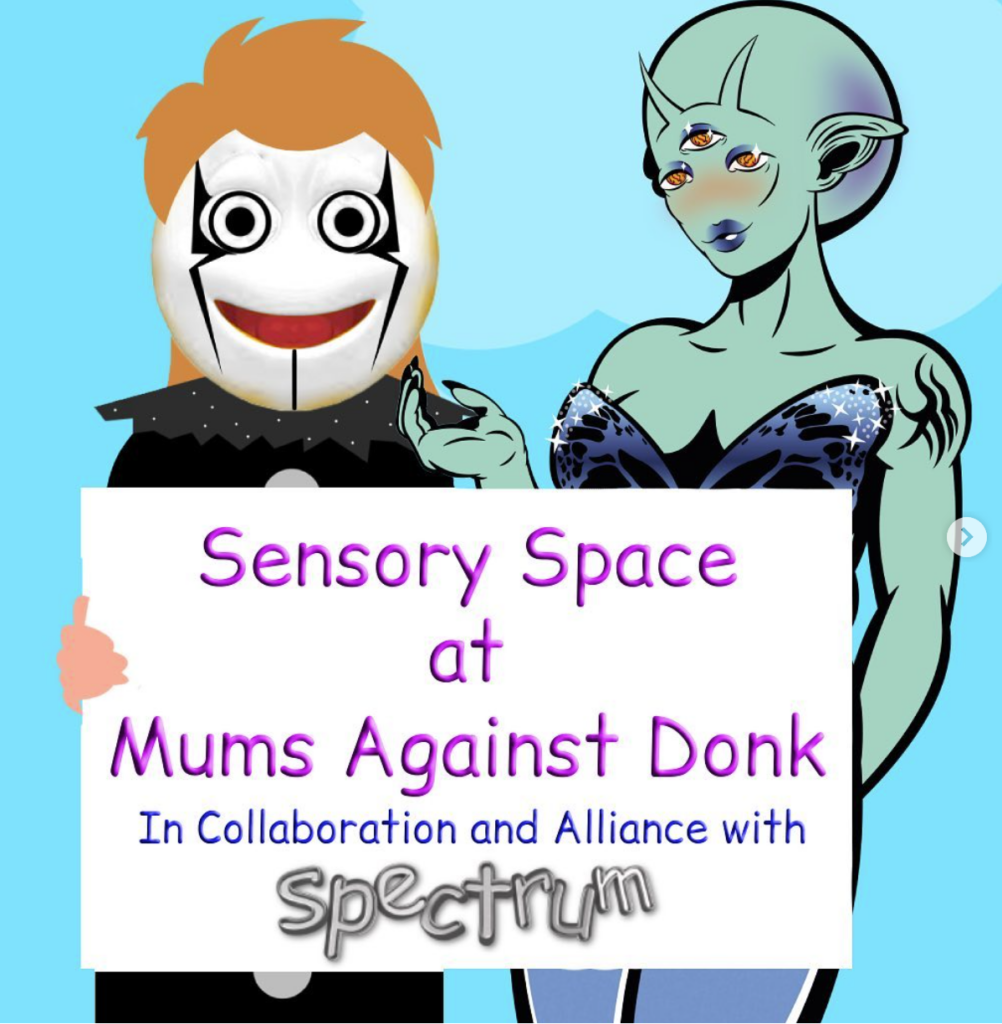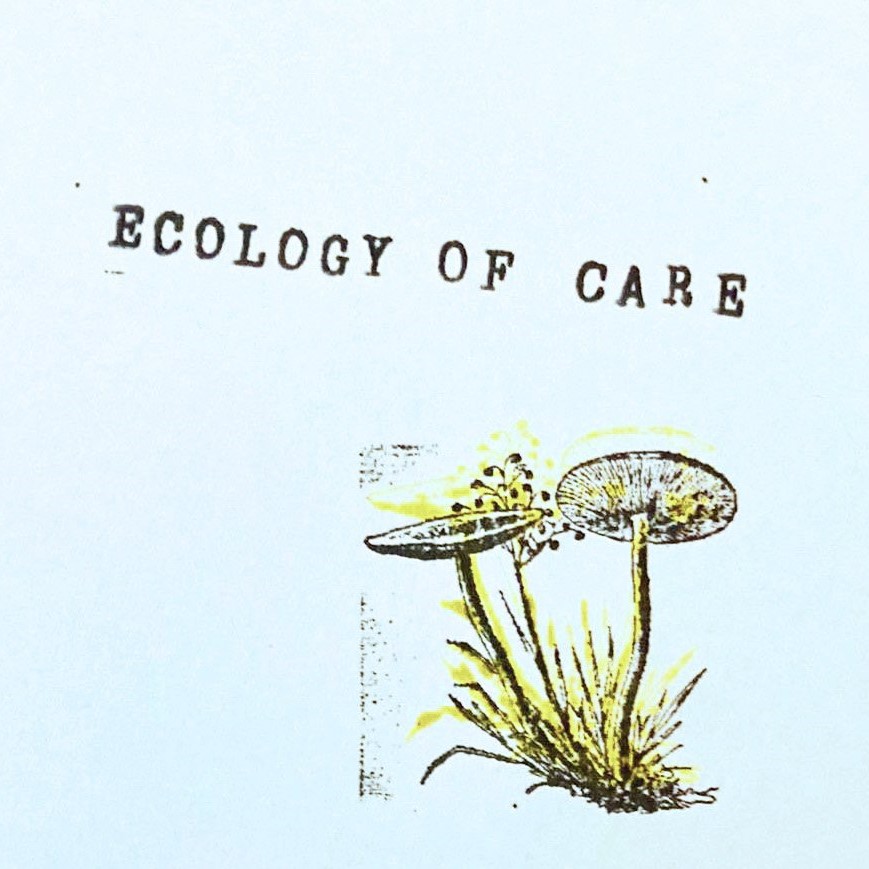Search Results for:
VibeLab and Transversal Project joined forces in research for Malmö
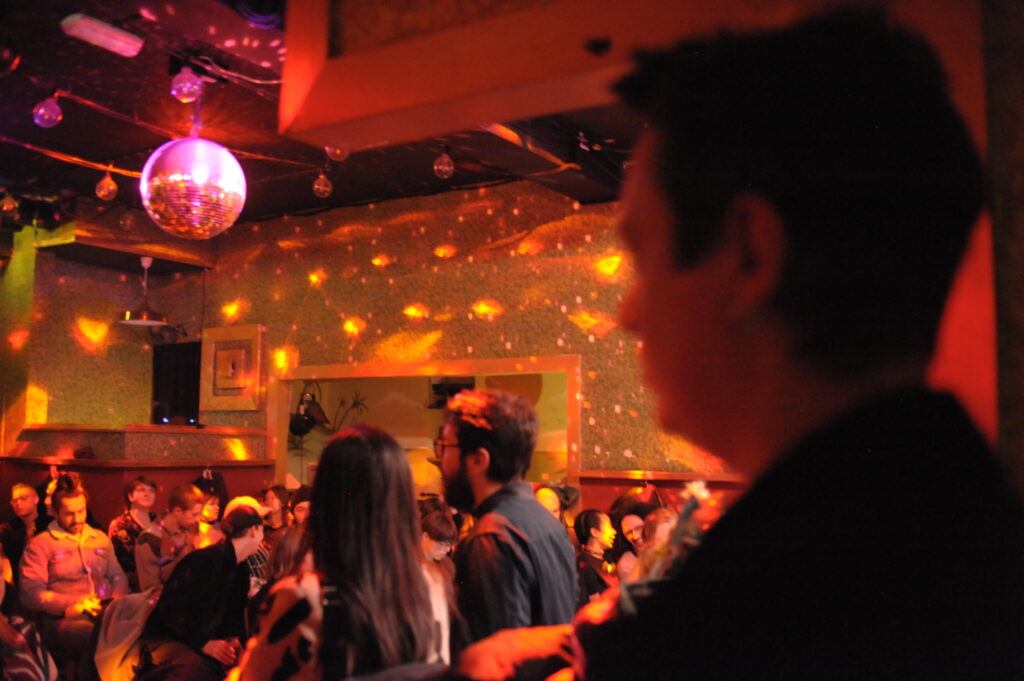
This is what we found out.
Malmö is Sweden’s third largest city boasting the reputation as a cultural hub with notable demographic diversity and a history of grassroots nightlife. However, issues of social and employment exclusion persist in the city. The report, which features a feasibility study and visionary outlook for the future of Malmö, was conducted by VibeLab in collaboration with Transversal Project on behalf of the City of Malmö Department of Business and External Relations.
“I hope that this study serves as an inspiring first step in sparking conversations on how nightlife can promote Malmö’s continued growth while creating a safer and more sustainable city,” – Harald Stjerna, project manager for the City of Malmö
The report was produced using a combination of qualitative research methods including an in-person needs analysis focus group which generated community-driven insights into Malmö’s non-commercial nightlife.
The following three themes were identified during the needs analysis due to their importance and the present challenges that exist for the community:
- Space for nightlife is essential but it is limited. Without safe, accessible, and affordable venues, nightlife actors cannot thrive.
- Funding is viewed as an integral support for the nightlife industry but awareness of such opportunities is limited and seen as inaccessible, especially to younger members of the community.
- Capacity building through skills sharing and meaningful engagement between the city and its nightlife community are both needed to enhance trust and understanding.
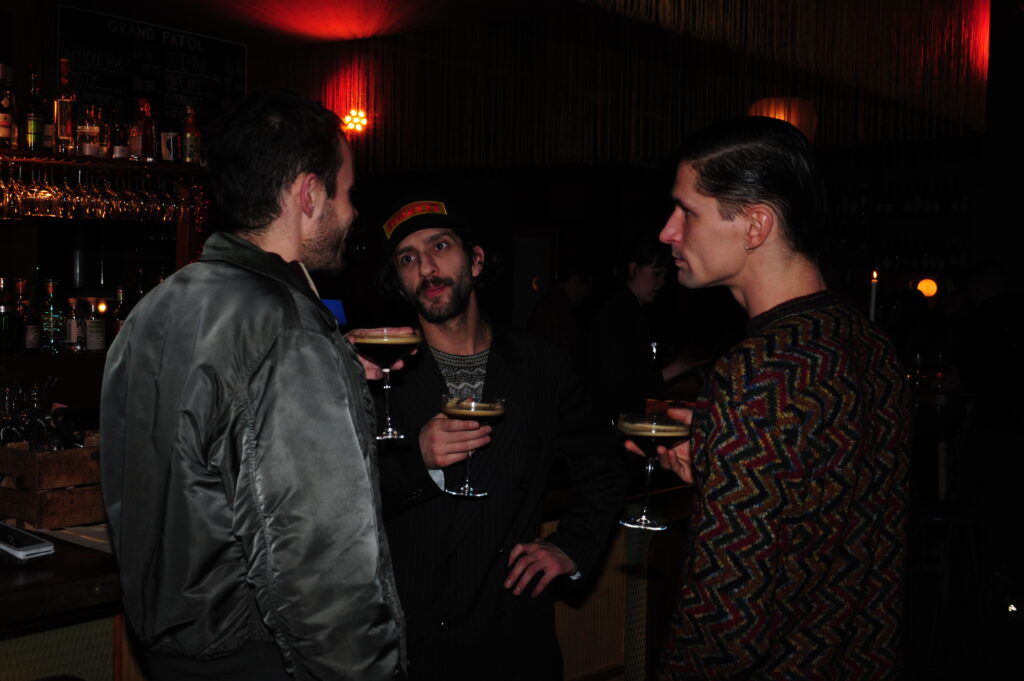
The report concludes with key findings related to the future aspirations of nightlife in Malmö and spotlights good practices from other cities around the globe. Discover more insights into Malmö’s nightlife through the full report.
Stay tuned!
The network of cities contributing their experiences and knowledge to nighttime governance is growing, regardless of their size or global positioning.
A Unified Vision for Sustainable Nightlife: A Roundtable to Inspire Collective Action
In pursuit of a shared vision for the future of sustainable nightlife, DJ’s For Climate Action (DJs4CA), VibeLab, and Future Meets Present united under the banner of DJs4CA’s 7th annual Earth Night Initiative to host a roundtable discussion on February 15th. This collaboration brought together representatives from night mayor’s offices around the globe and aimed to ignite a much-needed dialogue on sustainability within the nocturnal realms of nightlife and electronic dance music.
Our next roundtable discussion in the lead-up to Earth Night will take place on Wednesday the 3rd of April at 3 pm – 4.30 pm (CET) with nightlife operators. Want to join? Sign up here



Under the moderation of Eli Goldstein from DJs4CA, the discussion was set for an engaging exchange of ideas. With inspiring industry practitioners like Amer Jandali from Future Meets Present and Gerd-Jan Fritjers from Green Events NL gracing the roundtable, the discussion focussed on creating a shared vision for the future of sustainable nightlife.

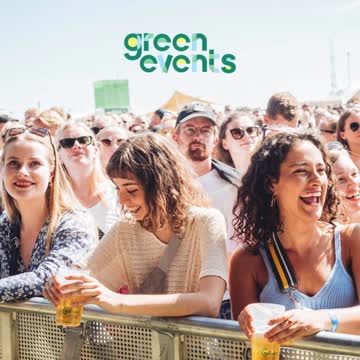
Representatives from various city administrations, including Jeffrey Garcia from the NYC Mayor’s Office of Nightlife and Thierry Charlois from Paris, brought their invaluable insights to the table. Their presence underscored the growing recognition of the critical intersection between nightlife and environmental stewardship.

It became evident that despite progress, significant challenges still lie ahead for nightlife officials and operators. Natalie Mets, nighttime advisor for the city of Tallinn, highlighted the need for stringent regulations focused on waste reduction and energy conservation. Meanwhile, Robert Gaa, Night Mayor of Mannheim, emphasised the importance of initiating conversations and securing funding to drive sustainability initiatives forward and get them over the line.
The discussion delved into practical strategies and innovative approaches to catalyse change within the nightlife ecosystem. From implementing green riders and banning single-use plastics to fostering city-driven initiatives and leveraging consumer demand, the participants explored a plethora of avenues for transformation.
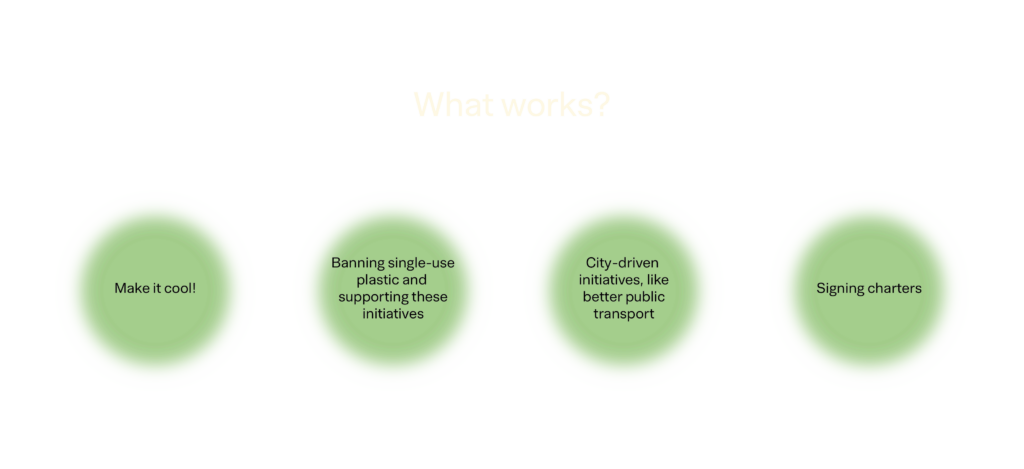
Yet, amidst the optimism and enthusiasm, there lingered a serious acknowledgment of the obstacles ahead. Gabija Liaugminaite from the Vilnius Night Office commented on the exclusion of music from mainstream climate discussions, while Varghese Chako of Nightlife United underscored the challenge of motivating venue owners, particularly those from underrepresented communities.
Nevertheless, the roundtable concluded on a hopeful note, with participants collaborating to create a shared vision for a more sustainable future. From advocating for regulatory support and financial incentives to promoting global best practices and fostering a culture of environmental awareness, the roadmap ahead was laid out.
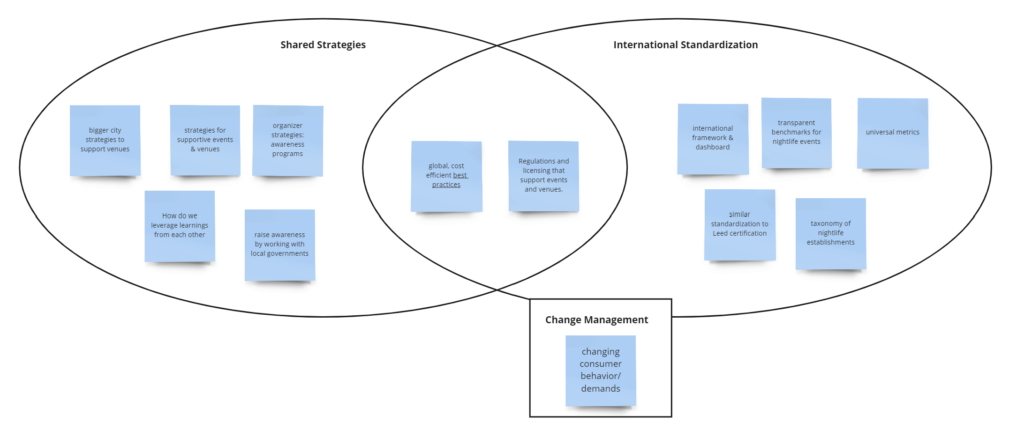
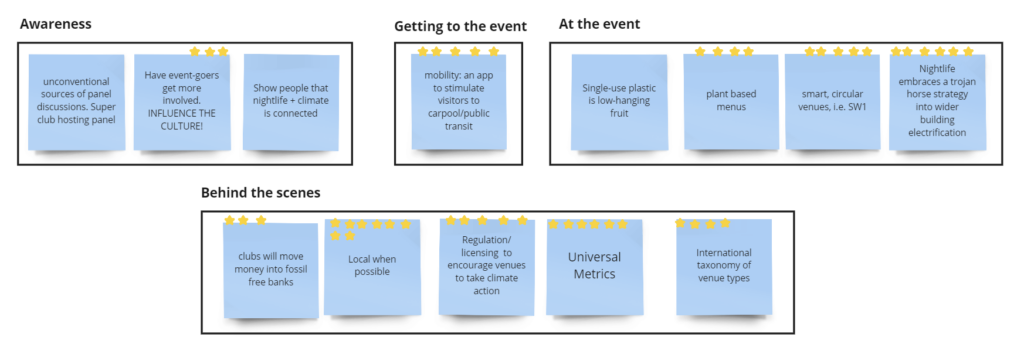
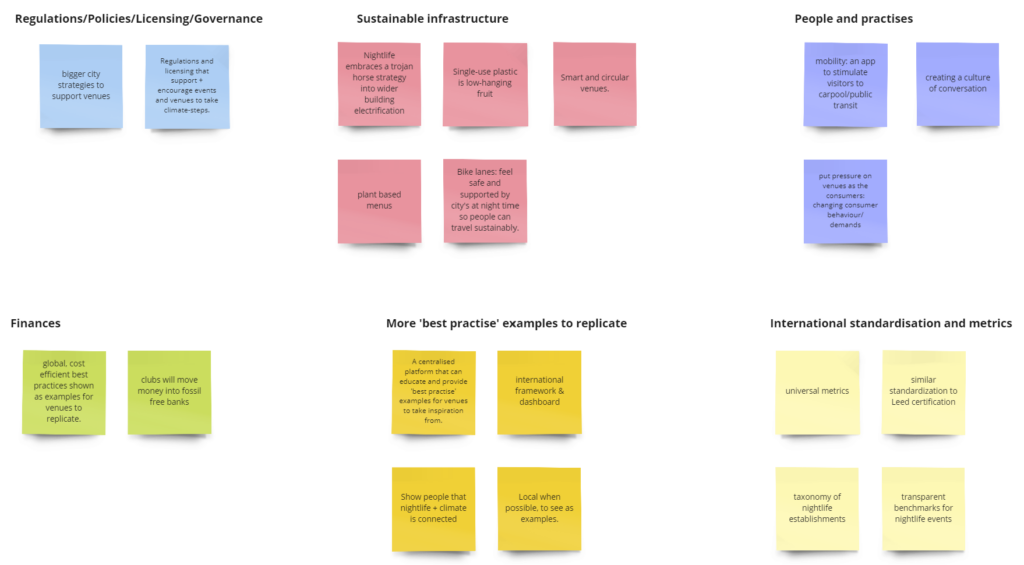
The Earth Night Initiative has sparked a movement that transcends borders and boundaries, represented by enthusiastic collaboration among the diverse participants of this first roundtable discussion.
The conversation doesn’t end here, our next roundtable discussion in the lead-up to Earth Night will take place on Wednesday the 3rd of April from 3 pm – 4.30 pm (CET). For this next roundtable, we invite nightlife operators, promoters, venue owners, and nightlife workers to come together on their shared vision for a sustainable future. Before a final workshop brings industry and night mayors together to create a framework for collaboration…
Want to join? Sign up here
OPEN CALL: VibeLab Launches NightSchool, an EU Funded Programme Offering €75,000 to Support Emerging Nightlife Curators
Five of Europe’s leading nightlife specialists team up to present NightSchool: An EU wide training programme designed to support night culture producers early in their career. This transnational education programme will focus on environmental, social, and economic sustainability.
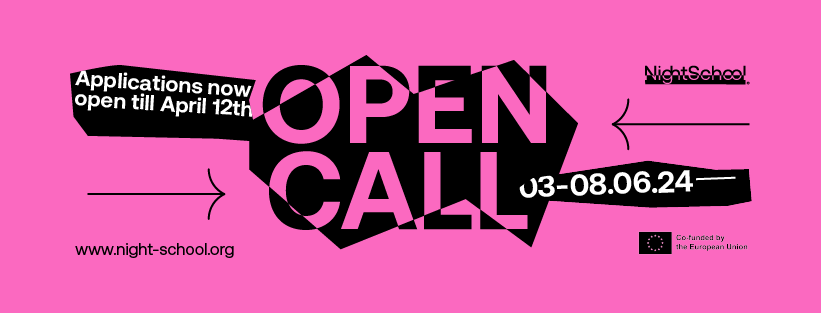
The project sets to pair nightlife visionaries spanning promoters, bookers, venue owners, to hands-on creatives with industry veterans and experts from the European culture circuit. Funded by the European Union’s Creative Europe, NightSchool will select 15 participants, providing a grant of €5,000 each. This will go towards facilitating a week of peer-learning sessions in multiple cities as well as to launching their own sustainable event ideas. Empowering individuals to turn their visions into reality is at the core of the programme.
NightSchool will offer recipients the chance to travel and engage in a sequence of face-to-face peer-learning sessions facilitated by respected experts and three distinguished European night culture venues. The programme launches with an open call to select young culture producers from across Europe. Together they will visit some of Europe’s most respected venues and learn from the best in their field.
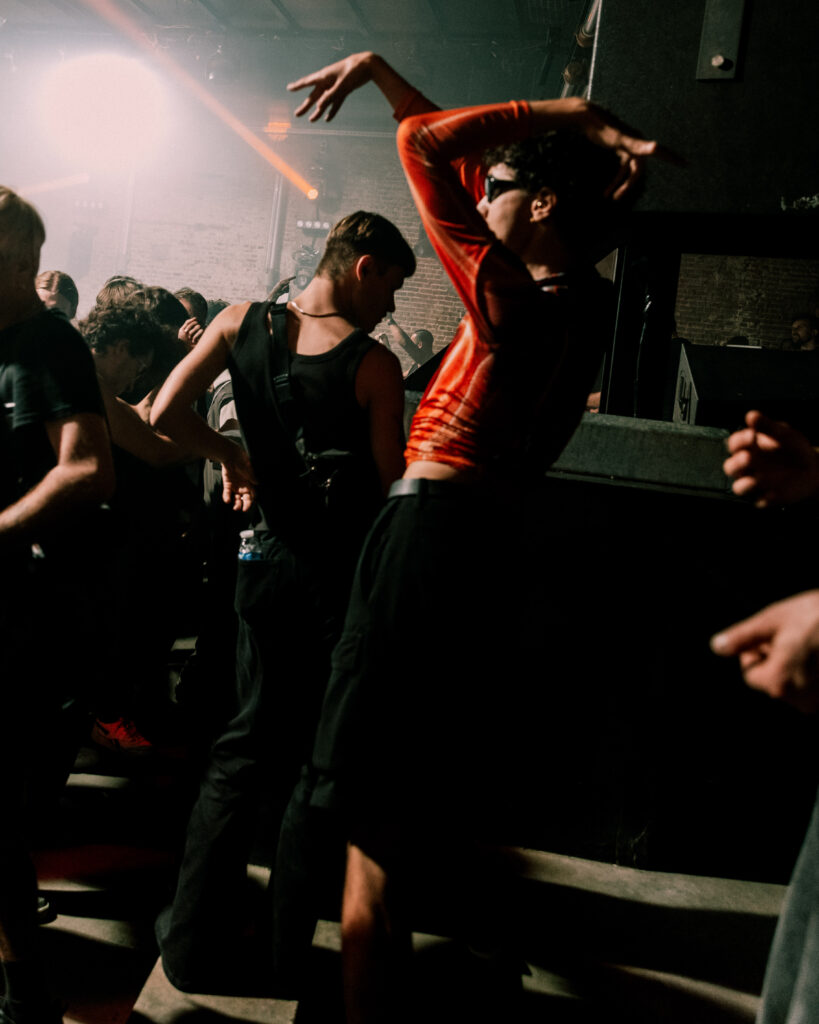
FUSE, Photo: Cederic Vandenbeghe
Co-founder Mirik Milan emphasises, “Nightlife creatives and culture producers are first and foremost problem solvers. They are needed right now, more than ever to take on the unique challenges and opportunities of our rapidly evolving cultural sector.”
The micro-funding scheme (€75,000) will support the selectees in pioneering and implementing sustainability-focused night culture events across all of Europe. To complement the training and mentorship programme, NightSchool is building an online resource and hybrid platform that offers educational content to a global audience, hosted and curated by a vast network of key experts within night culture and sustainability.
A joint effort by five partnering organisations, NightSchool is a collaboration between Vibelab, Belgian club institution FUSE, Latvian culture centre Kaņepes Kultūras Centrs, Italian based creative hub BASIS Vinschgau Venost alongside their in-house event KASINO Club, and Sweden-based cultural strategy and production agency Transversal Project.
This notion of collaboration is key to the programme’s mission, as Milan further highlights: “While the term ‘community’ is frequently overused in the commercial world, its essence lies in uniting a collective of like-minded souls together. At NightSchool, we join forces to address issues of diversity, inclusivity and solidarity. As well as climate action and the ecological dimension of night culture, we provide first-hand insights on maintaining a financially sound enterprise.”
Based on three core pillars of Social Awareness, Sustainability and Entrepreneurship, NightSchool creates inclusive, safe(r) and vibrant environments that actively promote diversity, wellbeing and positive community interactions. Proudly promoting environmental sustainability whilst minimising the environmental impact of nighttime cultural activities.
Through applied practices incorporating energy efficiency, waste reduction, sustainable sourcing and reduced air travel, NightSchool explores business activities within the nighttime cultural sector covering venue management, events organisation, and curating experiences aiming to enrich their respective city’s local scene.
Applications are open now, closing date for applications will be April 12th, with participants committing to a week long training 3-8 June 2024. You can apply HERE.

VibeLab’s NighttimeLab 2024 at SXSW: How can Nightlife go towards greener future and what role does AI play
🗓️ Date: Tuesday, March 12th, 2024
⏰ Time: 18:00 – 20:00 CST
🎟️ Signup: Get your free ticket
📍 Location: Thompson Hotel, 506 San Jacinto Blvd, Austin, TX 78701, USA
Following the success of last year, VibeLab is excited to participate in SXSW with two engaging discussions we’ve meticulously prepared for you. These sessions will explore the intersection of technology, culture, and sustainability within the nightlife and live entertainment industry. Join us in the excitement of SXSW on March 12th at the Thompson Hotel for an evening brimming with thought-provoking discussions and innovative viewpoints.
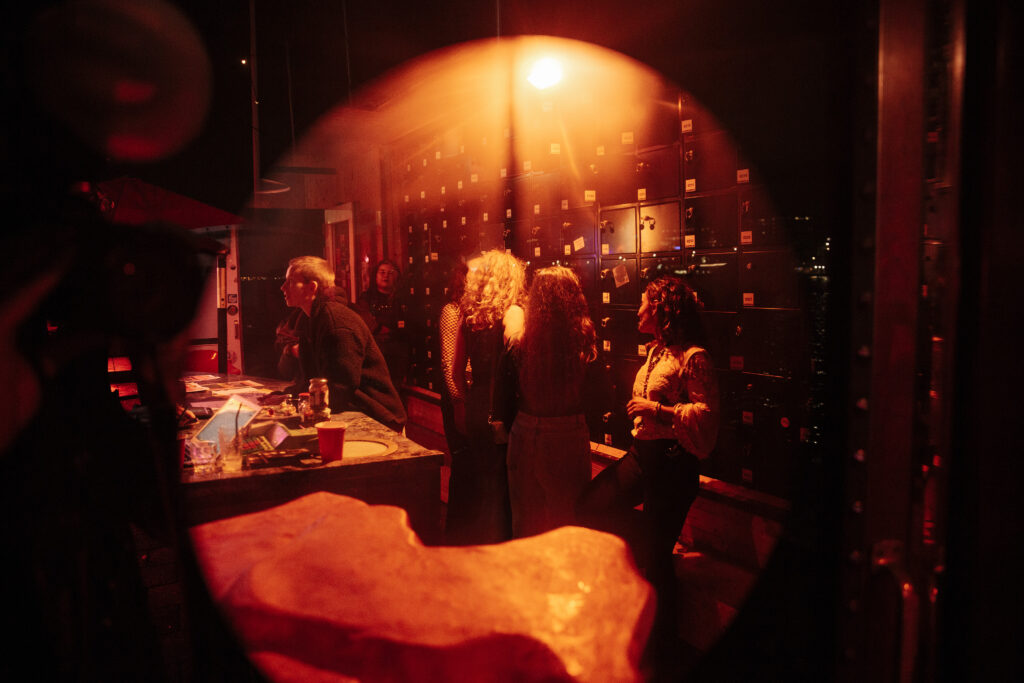
Photo credit: Raymond Van Mil
NIGHT SCHOOL launch and first open call
⏰ Time: 18:20 – 18:30 CST
Speakers: Lutz Leichsenring and Mirik Milan
In addition to our engaging panels at SXSW, we’re thrilled to announce the launch of the NIGHT SCHOOL project, a pioneering program aimed at shaping the future leaders of night culture by focusing on environmental stewardship, social responsibility, and economic sustainability. We are going to launch an open call for 15 candidates to become part of the 2024 NIGHT SCHOOL alumni.

Panel 1: Community Perspectives on AI in Nightlife and Live Entertainment
⏰ Time: 18:30 – 19:10 CST
Moderation: Mirik Milan
Speakers: Andreea Magdalina, Max Penk, Jess Reia, Jameson Thomas, and Lorrain de Silva
Understanding the ethical dimensions of Artificial Intelligence in nightlife is paramount. Dive into the ethical intricacies of AI applications, particularly in customer engagement, and explore methods to incorporate diverse community perspectives for a more inclusive future. Join our esteemed moderator Mirik Milan, along with speakers Andreea Magdalina, Max Penk, Jess Reia, Jameson Thomas, and Lorrain de Silva, as they unravel the transformative power of AI in shaping a more inclusive and engaging live entertainment landscape.

Panel 2: Transformation of Nightlife for a Sustainable Tomorrow
⏰ Time: 19:15 – 20:00 CST
Moderation: Lutz Leichsenring
Speakers: Kady Yellow, Niklas Effenberger, Eli Goldstein, and DJ SHANI
The urgency for sustainable development in urban nightlife requires a collaborative effort. Explore strategies with our moderator Lutz Leichsenring and speakers Kady Yellow, Niklas Effenberger, Eli Goldstein, and DJ SHANI as they delve into the integration of technology and sustainability in nightlife and urban development. Be a part of this session to drive meaningful change, fostering environmentally responsible and technologically advanced nightlife environments.

VibeLab is also part of Berlin House program
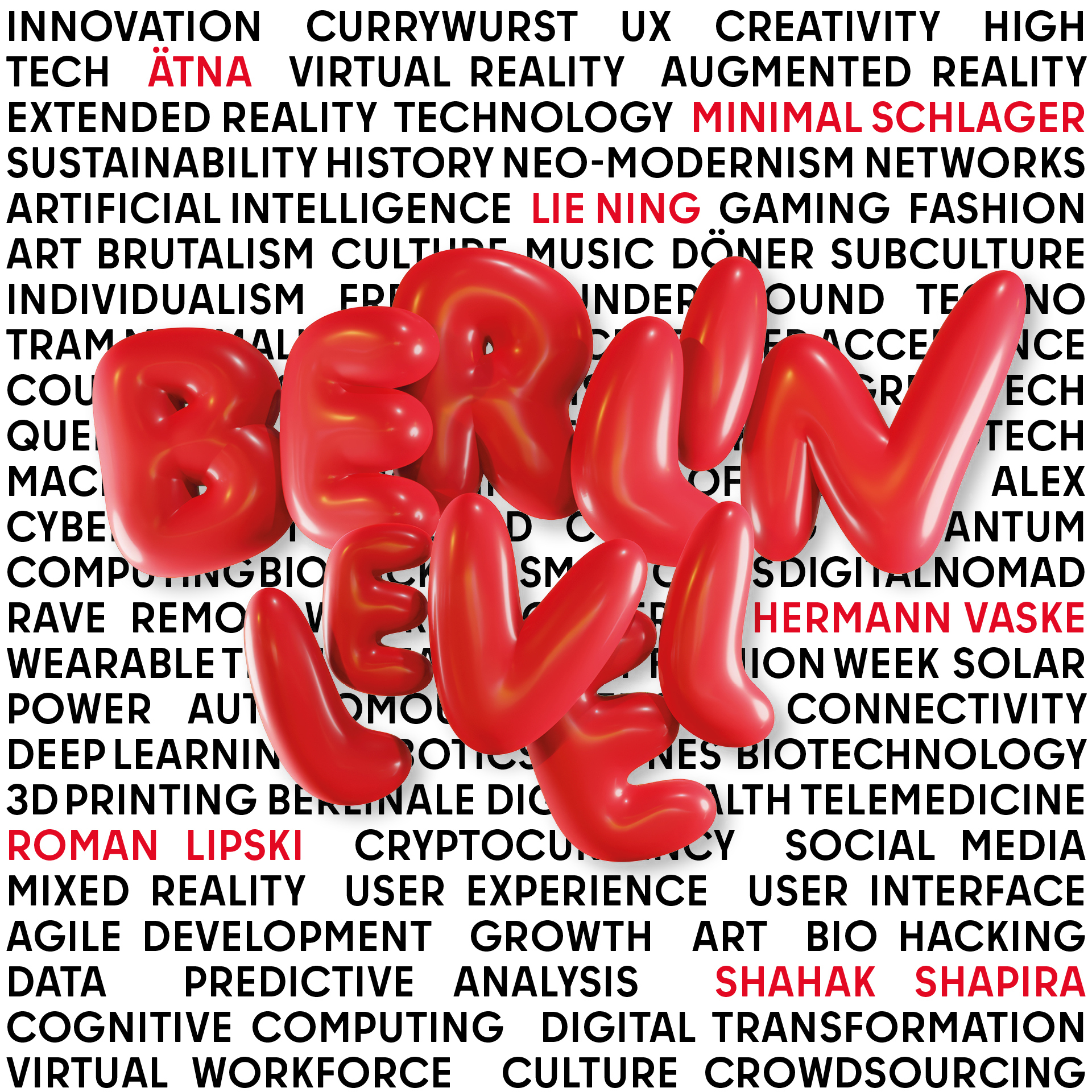
In a separate event from our SXSW lineup, Lutz Leichsenring from VibeLab will participate in a compelling discussion titled “Nighttime Communities and their impact on urban landscapes” on February 12th, from 4:00 to 4:45 pm CST at El Cockfight bar. This panel is set to explore the multifaceted impact of nightlife on urban development, creative economies, and the shaping of cityscapes.
Engage and Shape the Future
VibeLab’s panels at SXSW are more than presentations; they are invitations to be a part of shaping the future. Your voice is integral in navigating the evolving landscapes of technology, ethics, and sustainability in the entertainment industry. Join us at the Thompson Hotel on March 12th, 2024, from 18:00 to 20:00 CST, and let’s brainstorm together for a more inclusive, sustainable, and technologically advanced future in nightlife.
See you at SXSW!
Rotterdam will be in spotlight for Creative Footprint study in 2024
We’re happy to share that in 2024 we will be conducting a Creative Footprint study in Rotterdam. This initiative sets the stage for an invigorated, sustainable nightlife and cultural scene that the Municipality of Rotterdam, N8W8 R’dam has envisioned when commissioned VibeLab, in collaboration with the University of Pennsylvania’s PennPraxis, to conduct an in-depth study into the city’s vibrant music and nightlife spaces and communities throughout 2024.
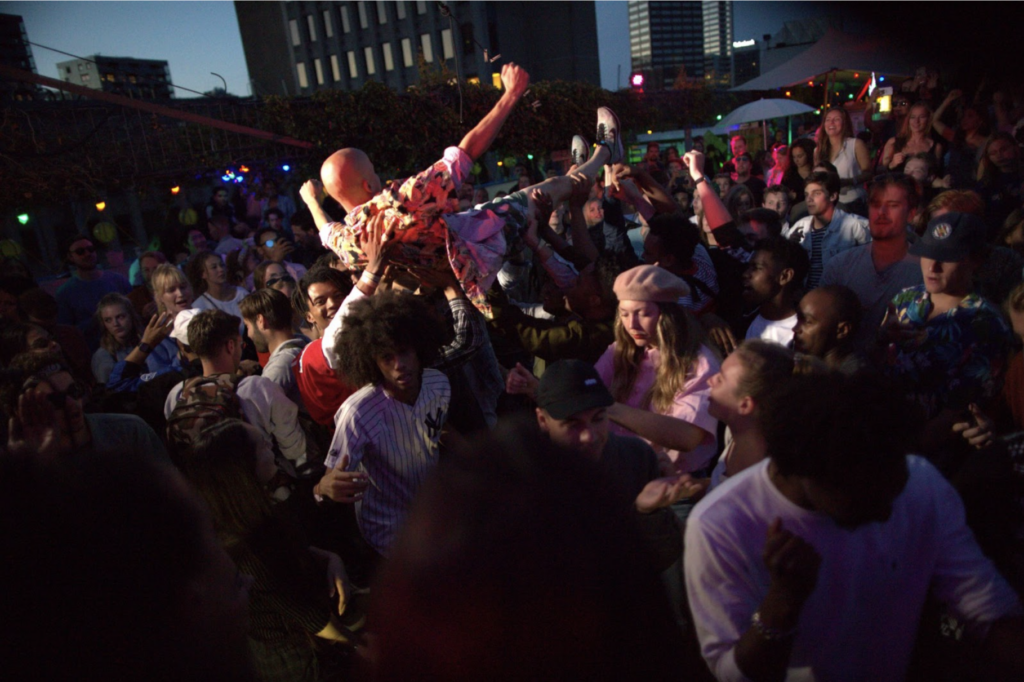
Photo credit: Mark Bolk, Instagram @markbolk
As Rotterdam stands on the cusp of integrating nightlife into its urban policy, this research aims to provide a comprehensive overview and actionable insights into the ecosystem of the city’s after-dark culture. N8W8 R’dam, a leading local nightlife advocacy and advisory organization, will play a crucial role in steering this project, ensuring a deep and authentic engagement with the city’s unique nightlife landscape.
Rotterdam is the seventh city that Creative Footprint study researched, joining the ranks of global cities like Berlin, Stockholm, and Montrál, where CFP sparked positive change and growth in the nightlife sectors.
Get Involved
The journey begins in mid-March 2024, with a series of engagements with Rotterdam’s most influential nightlife changemakers, setting the stage for a wider dialogue and data collection effort. This project is not just a study; it’s a movement towards a more dynamic, accessible, and thriving nightlife culture in Rotterdam.
We invite everyone interested in shaping the future of Rotterdam’s nightlife to get involved. For more details on how to participate or to stay updated on the project’s progress, please reach out via the Google form linked, follow N8W8 R’dam on social media, or subscribe to our mailing list.
Cities After Dark Chronicles: What can you do to protect venues at risk in your city?
This feature is part of our latest newsletter series we’re excited to launch! Dedicated to exploring the challenges and strategies for preserving nightlife culture around the globe. Cities After Dark Chronicles kicks off with a deep dive into an approach to saving at-risk venues.
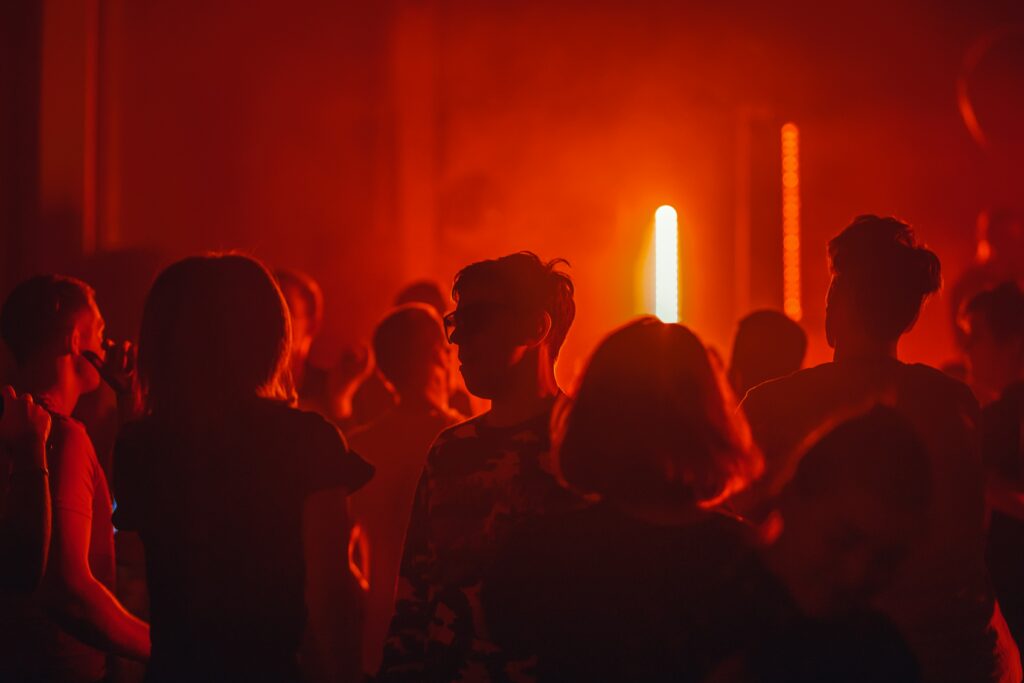
Photo: Max Titov
What can you do to protect venues at risk in your city? This is what we did in Montréal
As our cities evolve and urban development progresses exponentially, costs rise and threats to beloved music venues intensify. You may discover that once-thriving hometown clubs are struggling to survive; some may have already closed for good. Many cities today are losing such establishments that are battling against the pressures of urban change.
City administrations, especially in larger metropolises, can easily lose track of those venues and overlook venue closures amidst other urgent challenges. But nocturnal life is built on smaller businesses, and as more and more are lost, nighttime culture will suffer. A vivid night is an important part of healthy and functional cities.
Explore how we tackled venue protection amidst urban shifts
It is in these moments of questioning what is happening with the culture in your city that the seeds of positive change are sown. In the face of venue closures and the uncertain fate of once-thriving nightlife spaces, it is crucial to recognize that these challenges often stem from external forces rather than mismanagement. Unaddressed issues can rapidly push thriving nightlife establishments into vulnerability and risk of extinction.
However, in every obstacle lies an opportunity—a solution waiting to be unearthed. You just need to identify the causes precisely. Cities may seemingly share the same problems, however, labeling them with general terms like “gentrification” obscures city-specific manifestations and does not allow for tailor-made solutions.
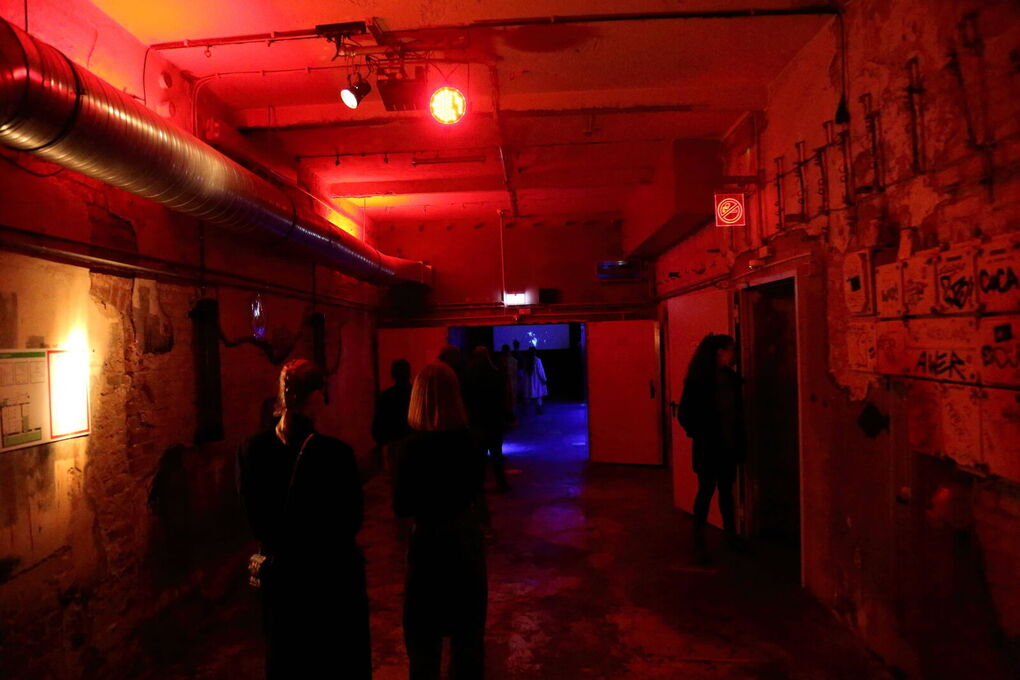
On the ground in Montréal, we learned about the pressures faced by nightlife operators. Local venue owners felt like they had hit the ceiling like there was no way they could grow under current conditions. One reason is that venue rents have more than doubled in the past five years. This is especially threatening to independent venues that operate close to the margin. This also prevents new independent venues from opening. We observed that rents are increasing most rapidly in venue-dense parts of the city, meaning that these districts are at risk of losing vibrancy and diversity in their nightlife.
Venue owners and operators were not only feeling these economic pressures. Squeezing them on the other end were pressures from existing and new neighbors. We heard a number of stories about contentious relationships between venues just wanting to provide nightlife experiences and neighbors just wanting to sleep. Venue owners and operators are finding creative solutions on their own in the absence of mediation by the city. Some, like Jules Gauliard-Martineau from Quai des Brumes, speak directly with neighbors to find solutions.
Cultural Infrastructure mapping at service
Claudy Philius, veteran promoter, and FRKY co-founder describes the damaging cycle of gentrification as new housing developments and their new occupants lead to venue displacement: “Everyone flocks to these condos because there’s an interesting nightlife…then boom…complaints left and right.”
Through cultural infrastructure mapping, we were able to identify the characteristics of venues at risk and what measures can prevent them from disappearing. In Montréal, we found that in particular, bars with dance floors in rapidly developing residential areas faced the most challenges. Conflicts between residents and businesses in these areas intensified, as urban development has created denser, mixed-use neighborhoods.
Operating late into the night also made these venues more susceptible to noise complaints, thus jeopardizing lease renewal. This cultural infrastructure mapping exercise proved instrumental in understanding the nuances specific to Montréal. Using this valuable information, we were able to deliver step-by-step recommendations that took into account implementation timelines and their feasibility and applicability in Montréal.
For example, not much can be done in the short term about doubling rents. However, if you can identify all of the sources of the pressures faced by venues, you can therefore create a strategy that will ease these pressures step-by-step. That is exactly what we did in Montréal.
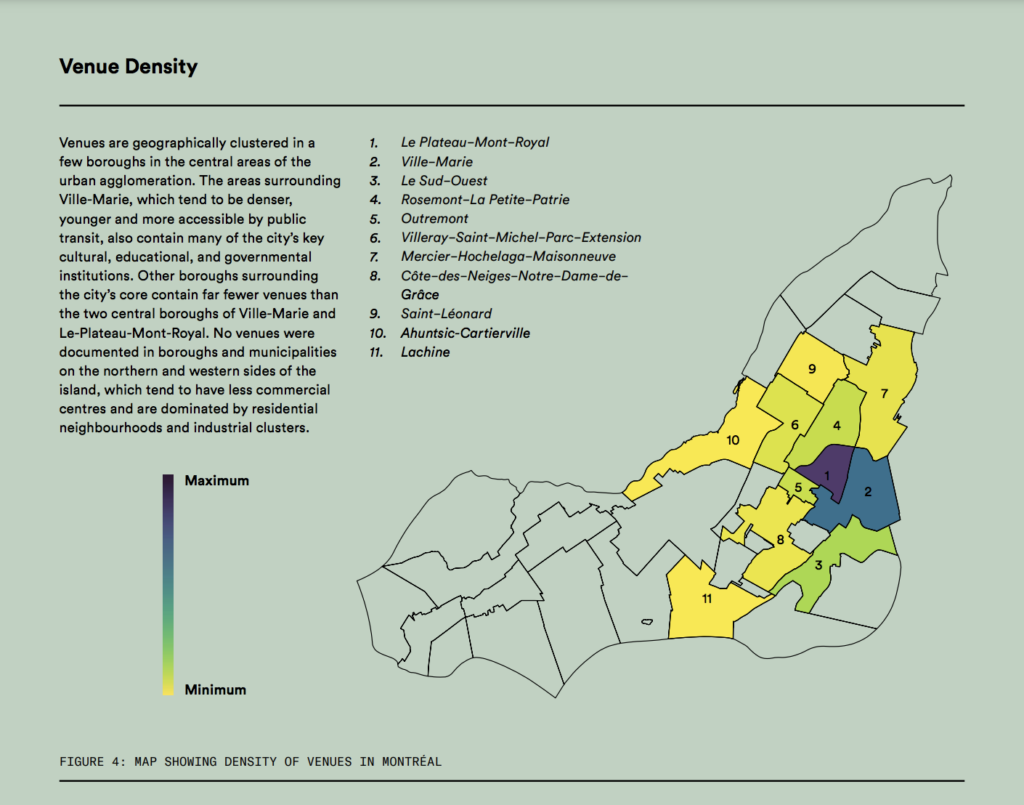
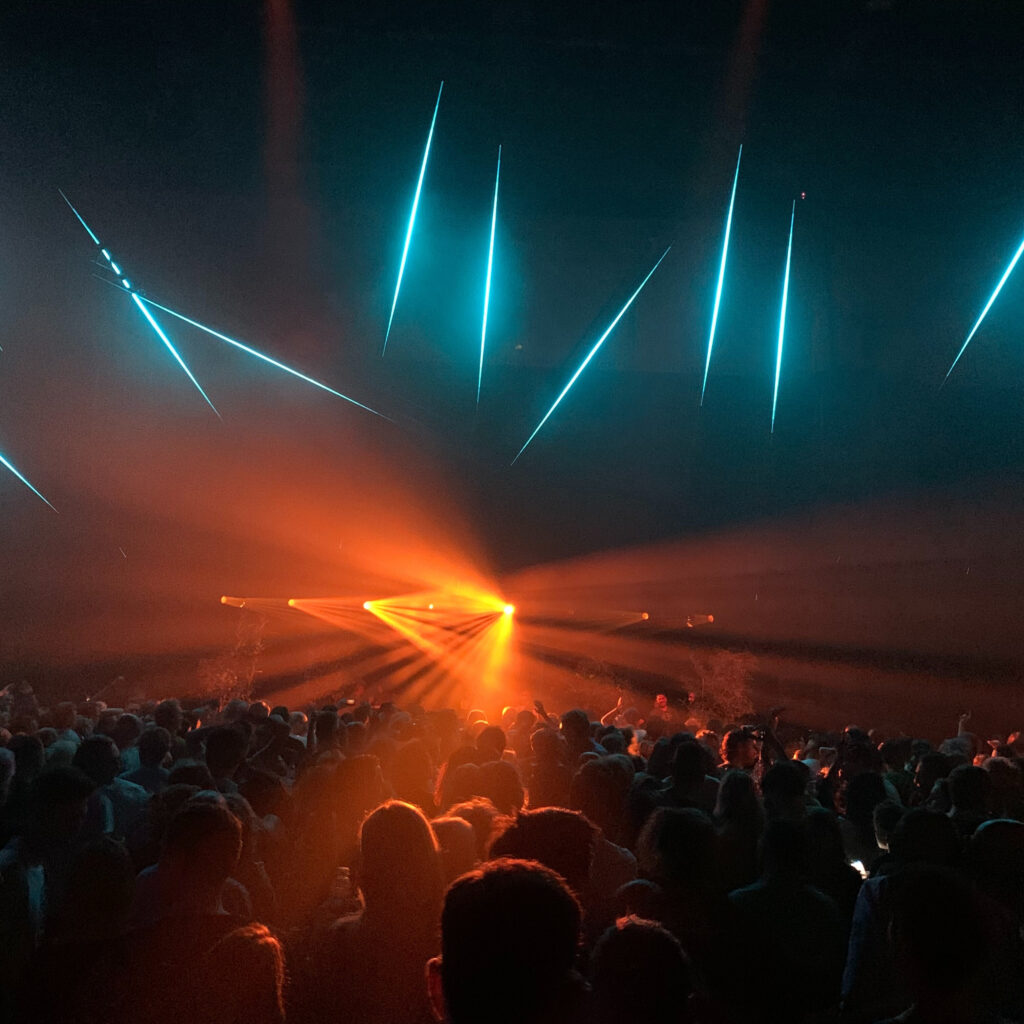
Photo: Amir Toossi
But what about your city? The issues plaguing your cultural hubs might differ, whether stemming from all types of urban development struggles or exacerbated by mismatched urban policy frameworks. Without the right research tools, addressing these challenges remains a matter of speculation.
Cultural infrastructure mapping serves not only as a tool for researching the problem. It is also a protective measure for avoiding future clashes between venues and residents in your dynamic neighborhoods. Cultural infrastructure mapping has proven effective in cities that face similar challenges to Montréal. Solutions have included the expansion of sound protections for nightlife venues – for example, the adoption of the ‘agent of change’ principle.
Our success in Montréal was rooted in research-driven insights and proactive measures. We were able to identify a set of unique problems, revise city frameworks, and come up with sustainable solutions that helped to bridge gaps between nighttime culture, nocturnal businesses, and the city administration.
We are committed to extending our expertise to your communities, leveraging data-driven strategies to protect and revitalize local nightlife venues.
Night Walk at NTE Summit: Navigating Urban Spaces on Thursday, the 8th of February.
Join us for this essential conversation as we navigate urban experiences shaped by gender and identity. Our international panel is set to delve into the nuances of navigating urban spaces, shedding light on challenges related to security and visibility, both by day and night.
Register to attend the Night Walk in Manchester at the NTE Summit (Day One) on Thursday the 8th of February. The night walk will start at 6 pm from Stage 3, Freight Island, and will be led by a group of specialists in local governance, urban planning, and social innovation. More information here.

The night walk aims to delve into how women, LGBTQI+ BIPOC, encounter and interact with urban spaces, drawing attention to the distinctive challenges, particularly regarding security and visibility during daytime and nighttime.
We look forward to seeing you there.
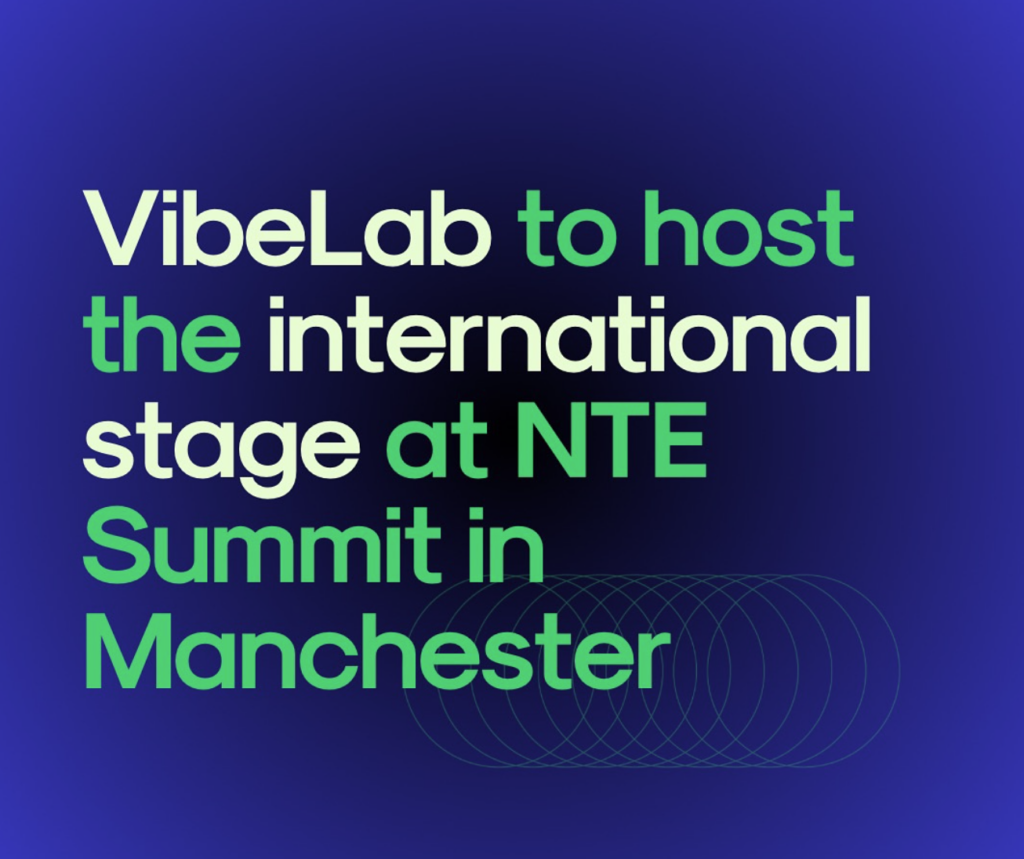
Earth Night Global Initiative: Uniting Nightlife for Sustainable Change
Join us for a dynamic collaboration between DJ’s 4 Climate Action (DJ4CA), VibeLab, and Future Meets Present, as we lead a pivotal roundtable discussion for night mayors and nighttime office officials in anticipation of the Earth Night festivities in April.
The first roundtable will take place online, on the 15th of February, 15.00 – 16.30 (Central European Time). Register here for our first roundtable with Night Mayors and Night Office officials.
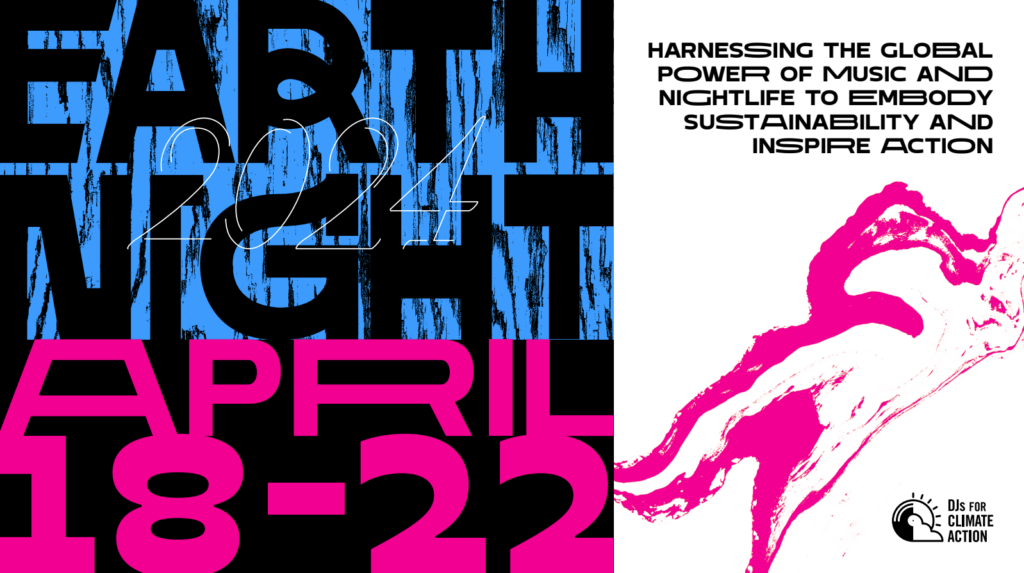
This roundtable marks the inception of a transformative movement. As part of the 7th annual Earth Night celebrations (April 19-21, 2024), VibeLab and its partners will host a series of roundtables and workshops from February to April, dedicated to connecting night mayors worldwide.
Our mission is to cultivate a shared learning platform, facilitating the exchange of resources, ideas, and strategies for a sustainable nightlife that harmonises with our communities and ecosystems.
Earth Night, established in 2018 by DJ’s 4 Climate Action (DJ4CA), is an annual global event series occurring during Earth Week in April. DJs, venues, and promoters organize events worldwide to demonstrate the power of collective action in addressing climate change. As the anticipation builds towards Earth Night, DJ’s 4 Climate Action has crafted a toolkit, an inspirational package for nightlife venue operators, guiding them towards crafting an Earth Night club experience that resonates with environmental sustainability.
Call to action: The first roundtable will take place on the 15th of February, 15.00 – 16.30 (Central European Time). Register here for our first roundtable with Night Mayors and Night Office officials.
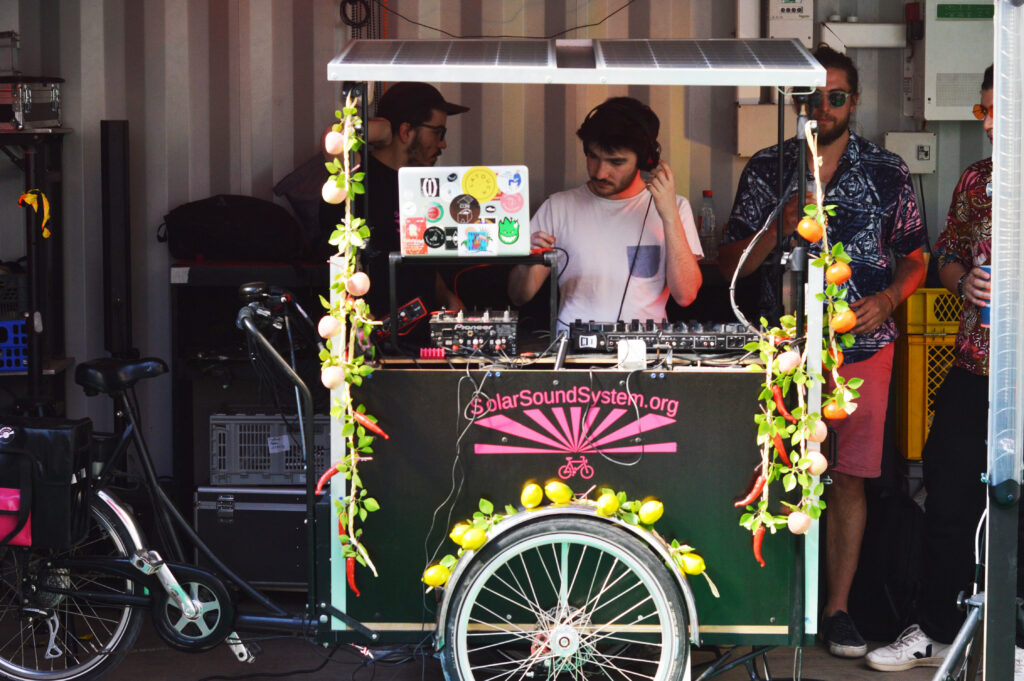
Solar Sound System, La Station Paris
Neurodiverse Nightlife: redefining nightlife for everyone
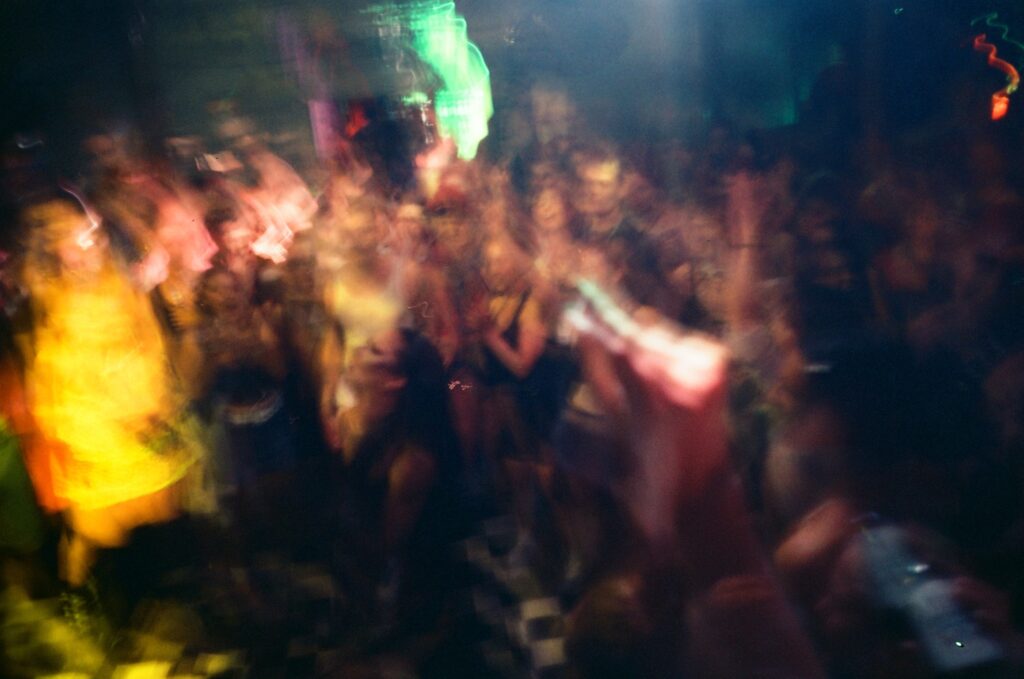
Nightlife Photography, 2023, by Solar Klinghofer Bar-Dov.
The dancefloor has long been a haven for individuals seeking solace, connection, and a break from the mundane. However, as we traverse the post-club era, it becomes imperative to question the true inclusivity of these spaces and consider the needs of those often marginalised, particularly the autistic community.
Historically, nightclubs have been hailed as spaces of liberation and unity, fostering a sense of belonging among diverse communities. Yet, as nightlife evolves and the landscape shifts, the essence of inclusivity faces challenges. The decline of traditional club structures and societal perceptions of nightlife as a “burden” has prompted a shift towards temporariness and seasonality in venue concepts. The question then arises: how can the future of nightlife be reshaped to prioritise safety and a sense of belonging for autistic individuals?
Attend our panel discussion on “Exploring the Evolution of Club Culture: Fostering Awareness, Inclusivity, and Accessibility” at 11 am on stage 3 at the Nighttime Economy Summit in Manchester on 8th Feb.
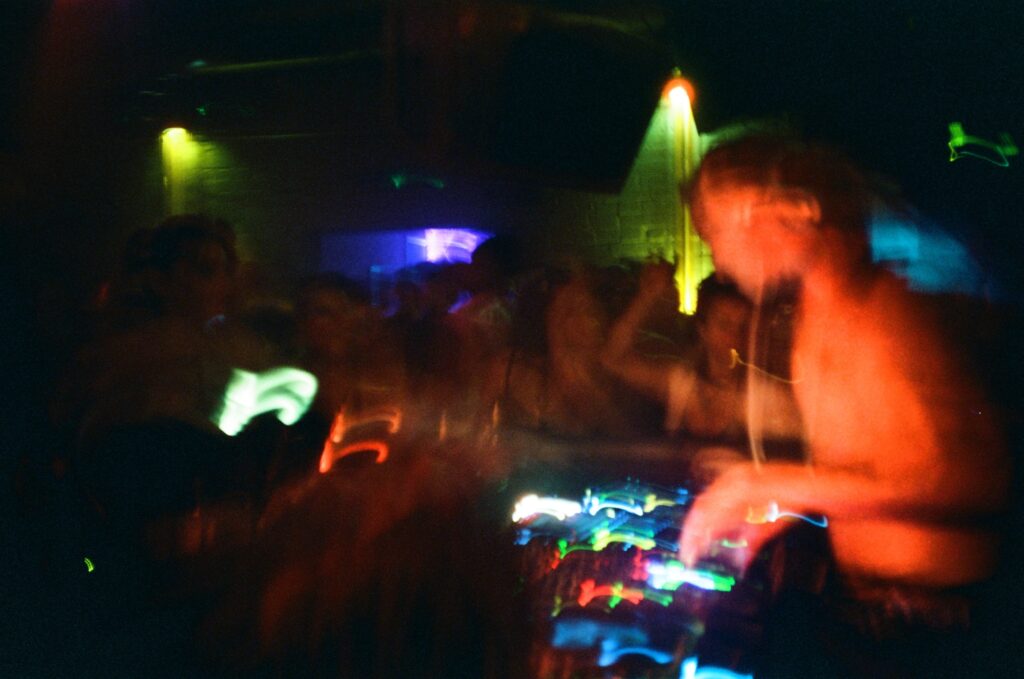
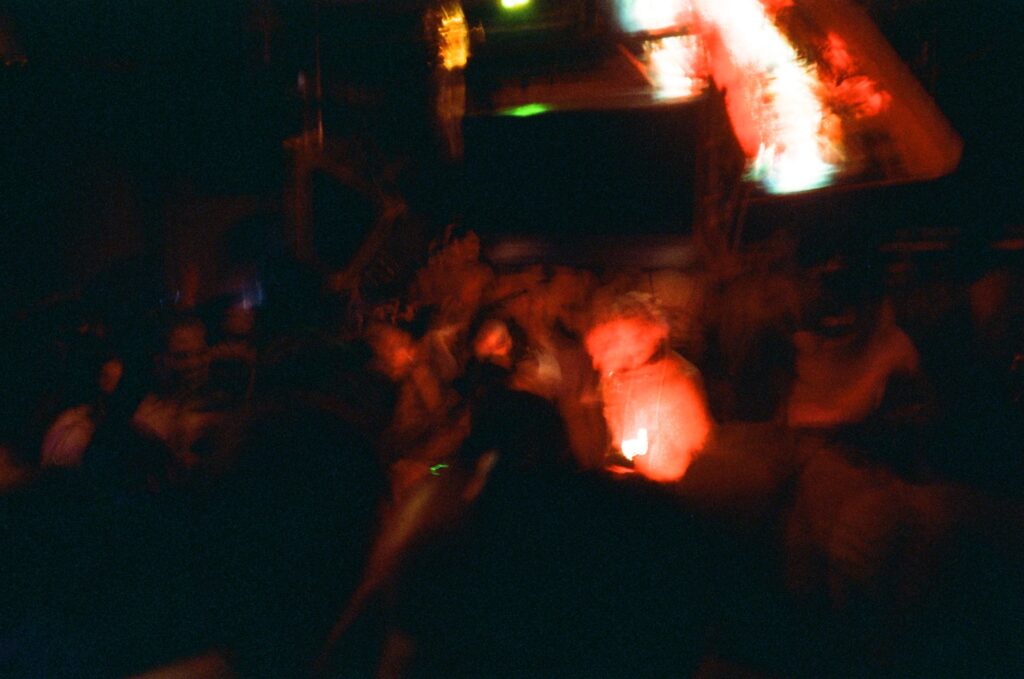
Photography by Solar Klinghofer Bar-Dov.
Autism, a spectrum of unique experiences, often encounters barriers in the sensory-rich environments of nightclubs. Sensory overload, social interaction difficulties, and a lack of accommodations can make navigating these spaces challenging. As we envision the future of nightlife, it is crucial to understand that the spectrum is not linear; it is more similar to a colour wheel, with each individual occupying a distinct position on this wheel. Recognising and accommodating this diversity is the key to fostering an inclusive dancefloor.
One of the primary barriers identified is sensory overload, where crowded spaces, flashing lights, and booming music create a whirlwind of stimuli. Autistic individuals often find their nightclub experiences cut short, leaving after a few minutes due to a lack of accessibility to meet their specific needs inside venues. The absence of low-volume areas within clubs, where individuals can seek respite from the sensory overload, underscores the need for design innovation.
Herein lies an opportunity for the evolution of nightclub design – a concept rooted in “sensory zoning.” Professor Magda Mostafa’s ‘ASPECTSS*’ highlights the potential benefits of clearly designated high-stimulation and low-stimulation zones within built environments. Implementing such an approach not only caters to the needs of autistic individuals but enhances the overall experience for all patrons. Nightclub design can embrace inclusivity through innovative spatial sequencing, escape spaces such as chill-out rooms, and allowing for spatial transitions in the space between high-sensory and low-sensory rooms.
Nightlife, as an immersive experience, is not confined to the dancefloor alone. The anticipation of entering a crowded venue, standing in lines, and navigating unplanned social interactions can trigger anxiety, emphasising the need for predictability. Venue Accessibility Plans and Access Riders can offer comprehensive information about the layout, ensuring accessibility for clubgoers and empowering individuals to plan their nights out in advance.
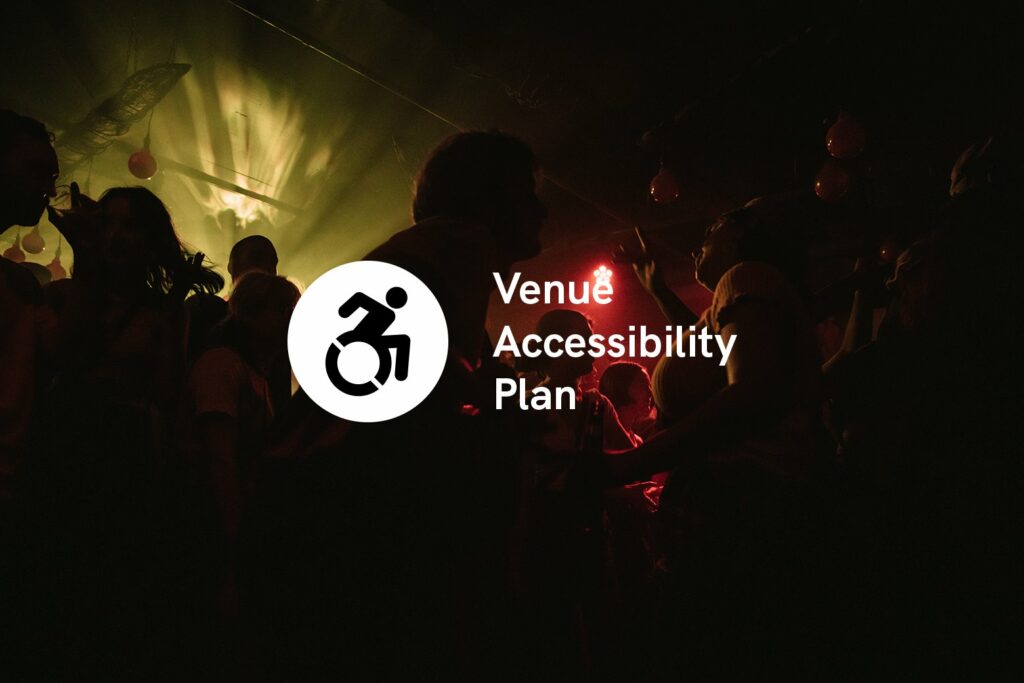
Sub Club Melbourne | Venue Accessibility Plan
Moreover, the introduction of live broadcasting events transcends physical boundaries, enabling everyone to partake in the club experience no matter their access needs. The universal design principle comes into play, offering options that enhance accessibility and cater to the diverse needs of both neurodivergent and neurotypical individuals.
Education and awareness emerge as pivotal elements in reshaping the nightlife landscape. Stereotypes and misconceptions surrounding autism often lead to a lack of understanding. Stakeholders, including club owners, staff, security, and patrons, should be aware of the diverse needs within their venues and be transparent with patrons on their offerings. Transparent accessibility plans, clear community guidelines, and informative graphics strategically placed throughout venues, such as clear signage, contribute to a safer and more inclusive environment.
Collaboration and co-creation with the autistic and neurodiverse community are cornerstones of this transformative journey. Sensory Spaces can offer a respite from the typical club setting and produced in partnership with neurodiverse collectives, such as Spectrum and Ecology of Care.
Glastonbury Festival embraced Sensory Calm Spaces at their 2023 edition, fostering positive feedback from both neurodiverse and neurotypical attendees. Allowing patrons to provide feedback easily is crucial in consciously improving your venue to suit diverse needs. These initiatives showcase the power of collective effort in creating safer and more inclusive spaces.
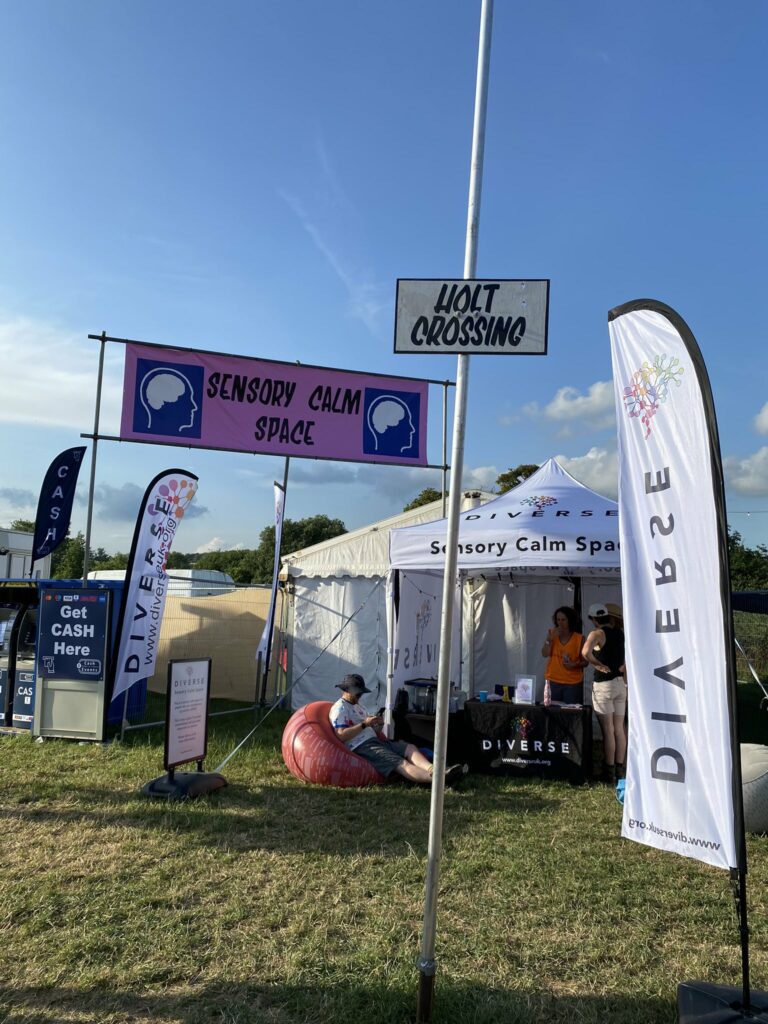
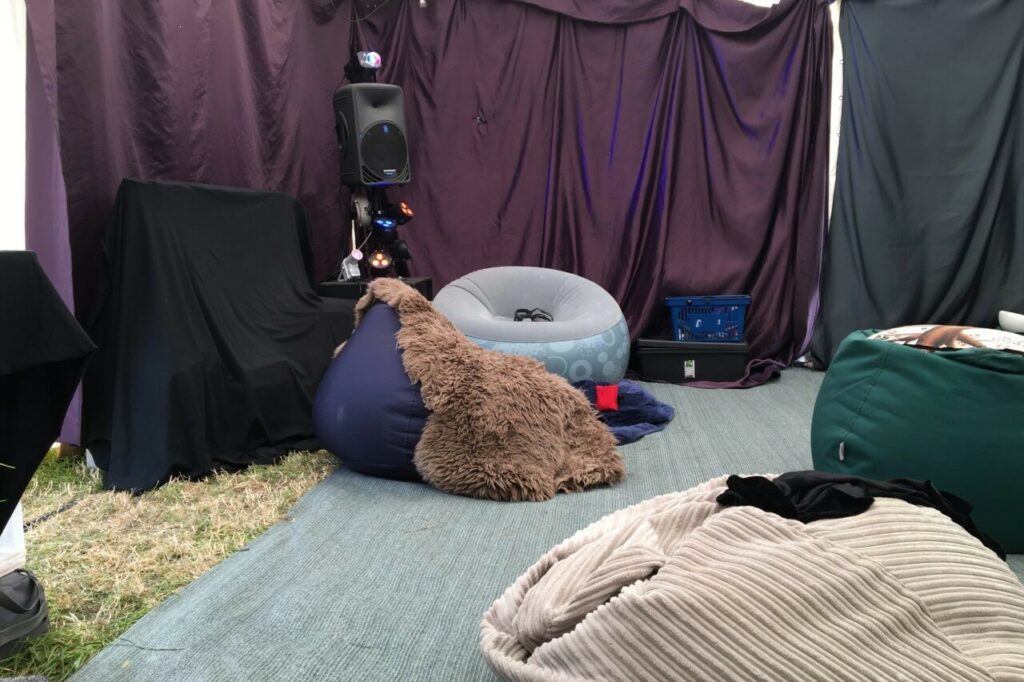
Sensory Calm Space by Diverse UK at Glastonbury Festival.
As we envision the future of nightlife, let it be a harmonious blend of diversity, where dancefloors transcend barriers and embrace the unique needs of every individual. By accommodating the authentic traits of autistic individuals, nightlife can evolve into a more inclusive space for all, where dancefloor intimacy and empathetic spaces redefine the essence of community on the dancefloor.
If someone isn’t invading your personal space or behaving aggressively, consider extending grace and generosity to share the space with them. The dancefloor should promote an empathetic community, and as we move forward, let empathy guide our steps towards a future where everyone, irrespective of their neurodiversity, finds their place in nightlife.
See you at the Nighttime Economy Summit on 8th Feb!
Nighttime Economy Summit: International Stage Program revealed!

Exploring accessibility & awareness, the impact of radio on communities, sensory immersion in the club space, and navigating cities safely.
Vibelab proudly announces an international talk program that will take place at the Nighttime Industries Association’s event on Thursday, 8th February 2024. Programmed by Jessie Dymond, the International Stage at the Nighttime Economy Summit takes place in Manchester at Freight Island. The program promises to highlight the most pioneering worldwide practices, trends, and breakthroughs in music-focused and nightlife culture.
International Night-Time Economy Stage Schedule:
SESSION 1: 11:00 am – 12:00 pm
Title: Solidarity and Accessibility: The Evolution of “Club Culture“
This session explores the resurgence of the dancefloor as a space embracing inclusivity and queerness, focusing on accessibility for neurodiverse individuals and people with disabilities- honouring the beginnings of electronic music spaces, which provided a haven for society’s most vulnerable.
Moderated by Katouche Goll, Content Creator and PR
- Luis Manuel Garcia-Mispireta is an ethnomusicologist and Popular Music professor at the University of Birmingham, also part of Room For Resistance, Berlin. Birmingham, UK
- Robbe Van Bogaert, Creative Director + Nightlife Expert, Human Power, Antwerp Belgium
- Cristiana Vale Pires, Researcher & Manager, Kosmicare, Lisbon, Portugal
- Yewande Adeniran is an artist, DJ, academic, writer and founder of INTERVENTION
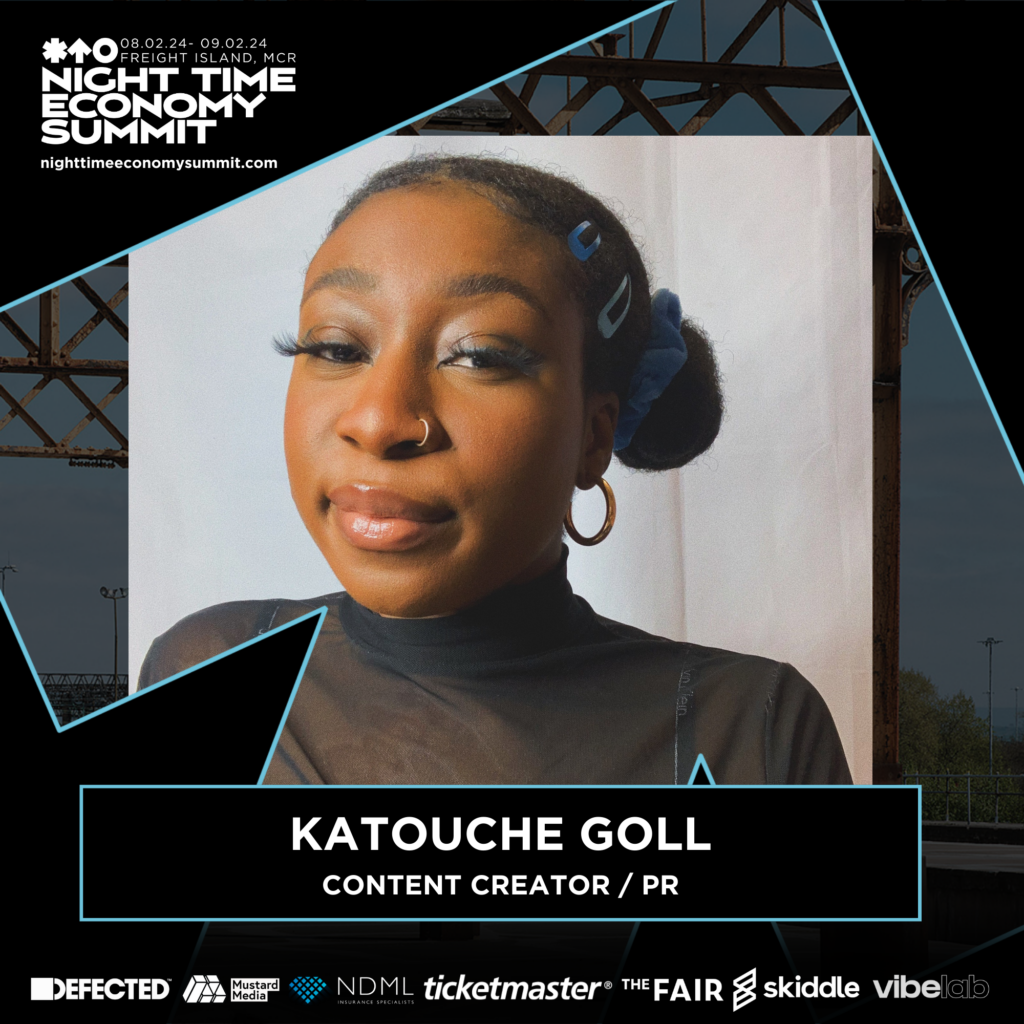
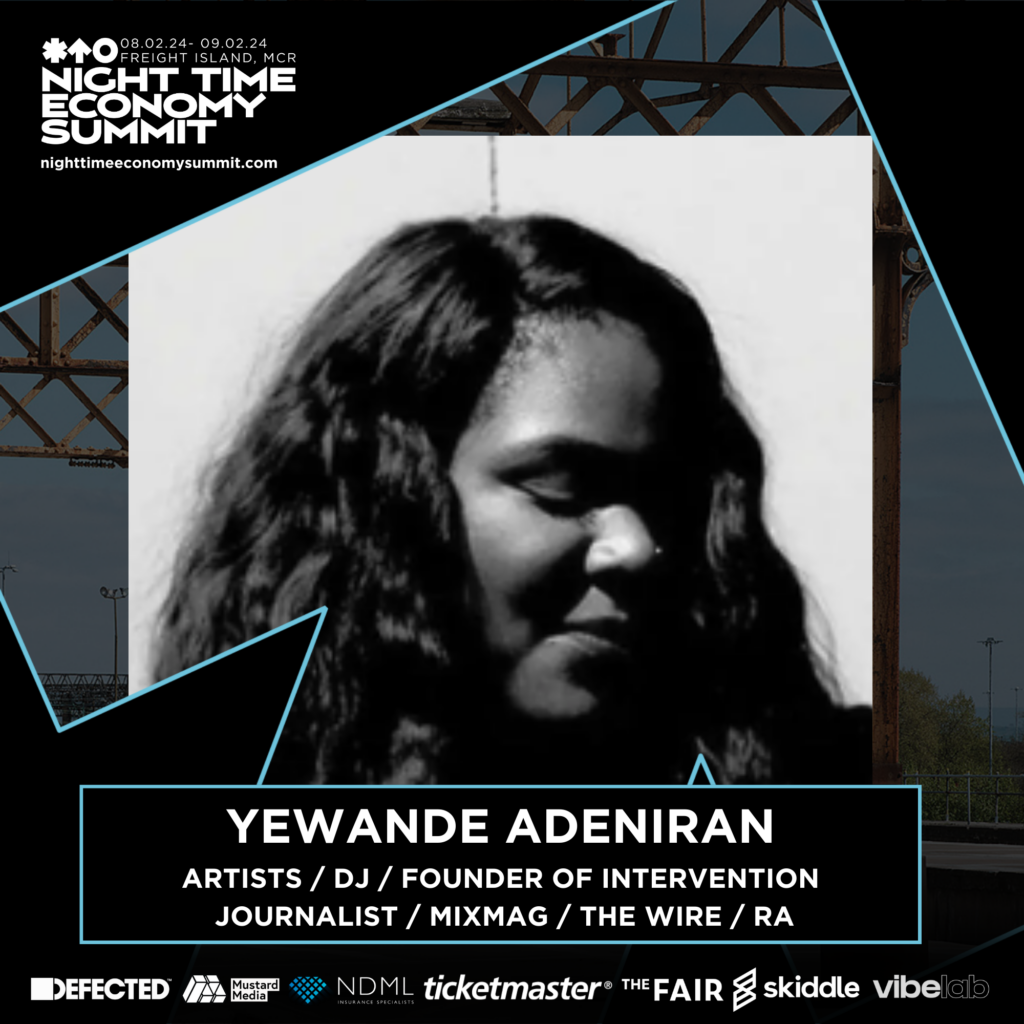
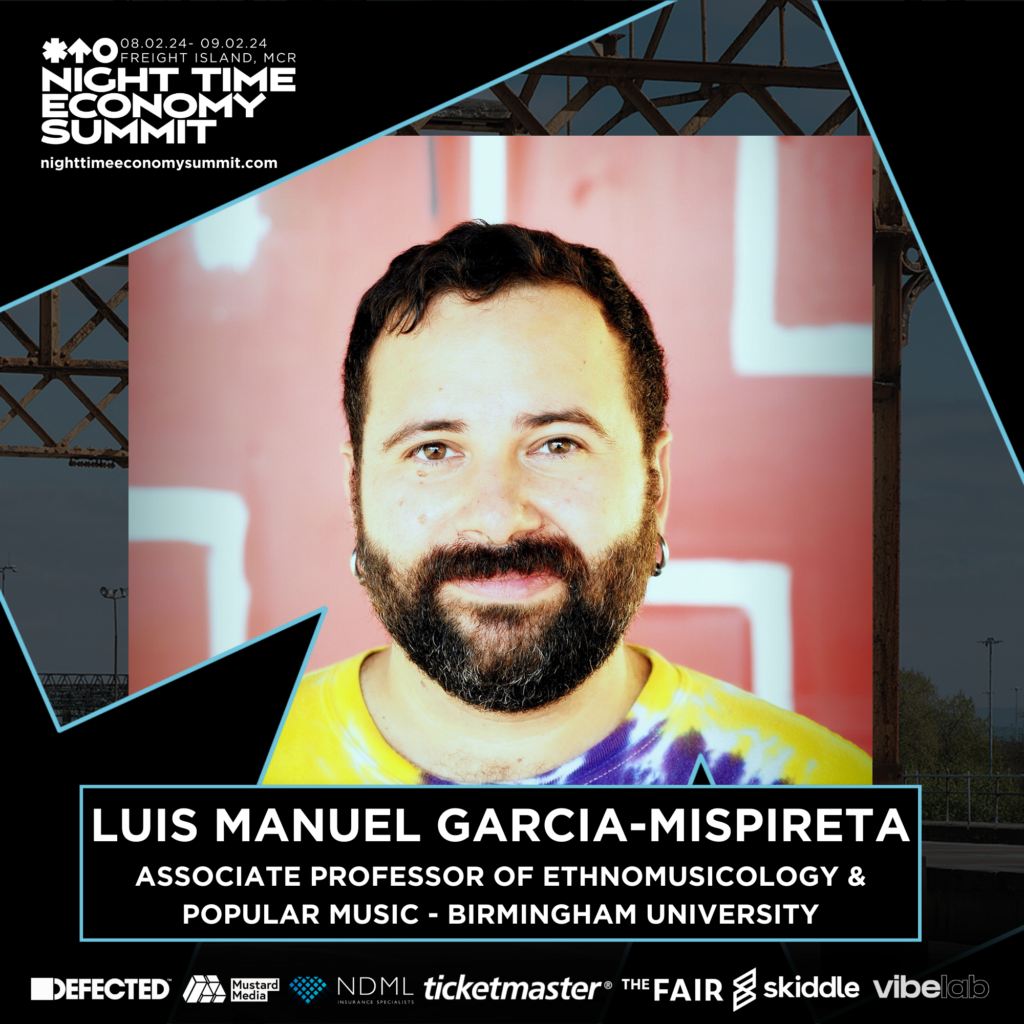
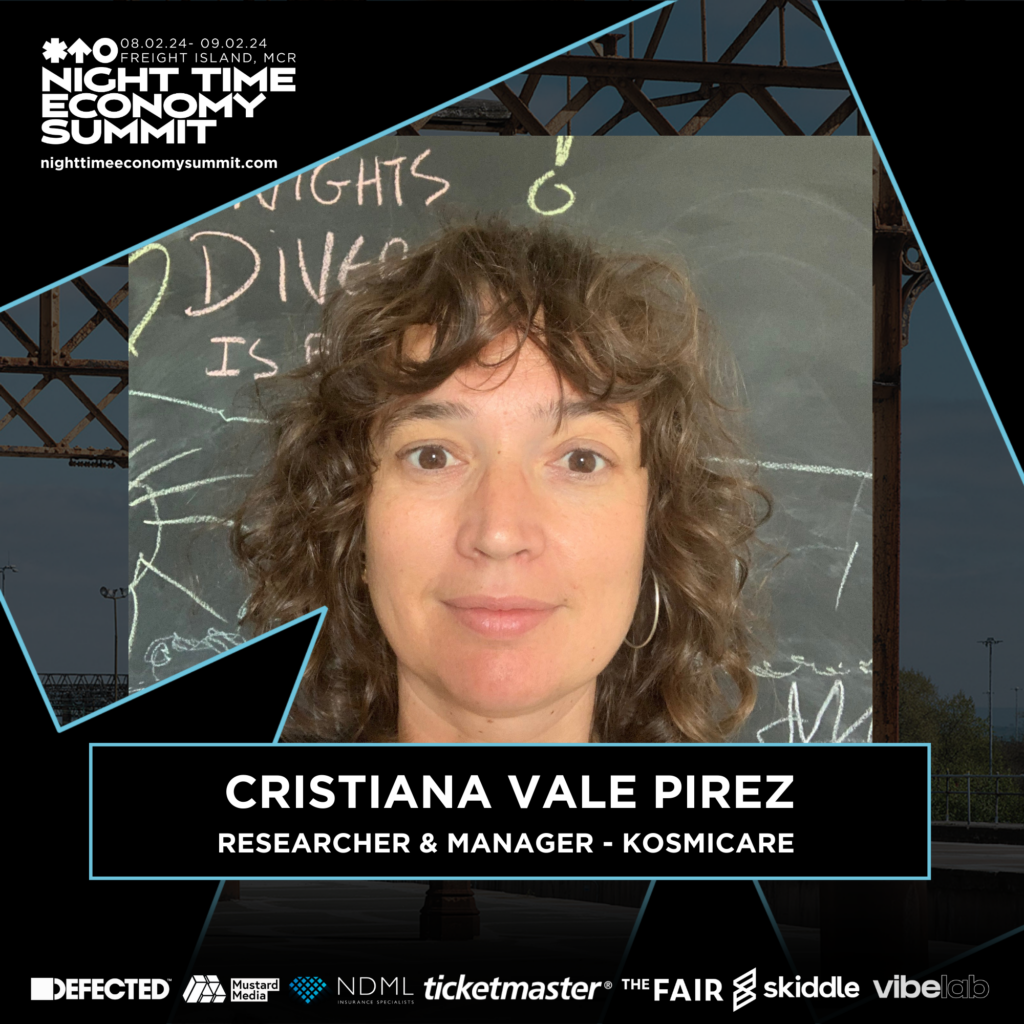
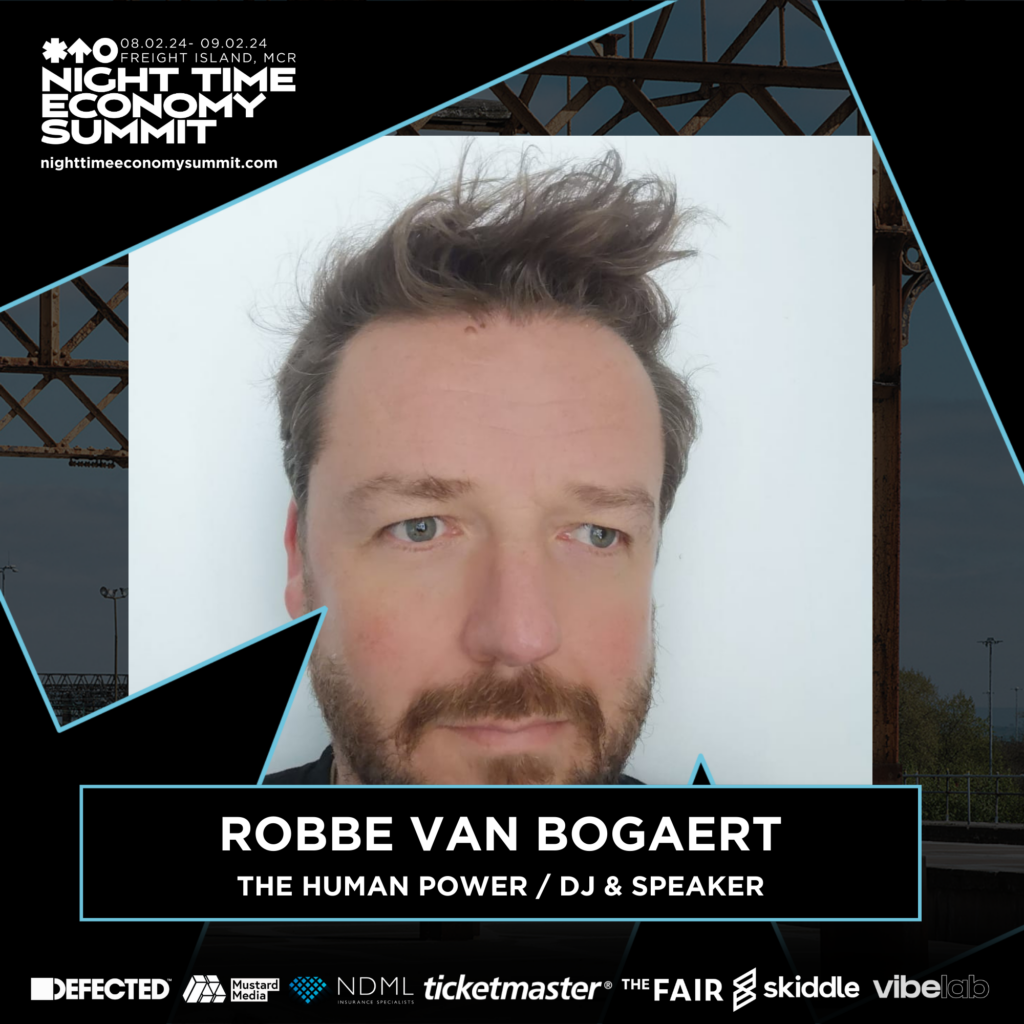
SESSION 2: 12:15 pm – 1:15 pm
Title: Radio Waves: Revolutionizing Solidarity and Connection
Moderator: Christa Belle Walley, DJ, Promoter, Radio Host, Ableton.
This panel discussion explores the transformative role of radio stations in reshaping collaborative efforts within the club industry. Key speakers include:
- Richard Akingbehin, Co-Founder of Refuge Worldwide, Berlin, Germany
- Olha Udovenko/Udda, DJ, former member of Gasoline Radio, Kyiv, Ukraine
- Moe Choucair, Audio Visual Artists, Programmer – Radio Alhara, Music Venue Director – Ballroom Blitz, Beirut, Lebanon
- Zakari Mokrani (LIVING GATLATO) is an NTS radio resident, cultural theorist, DJ, and Marseille, France.
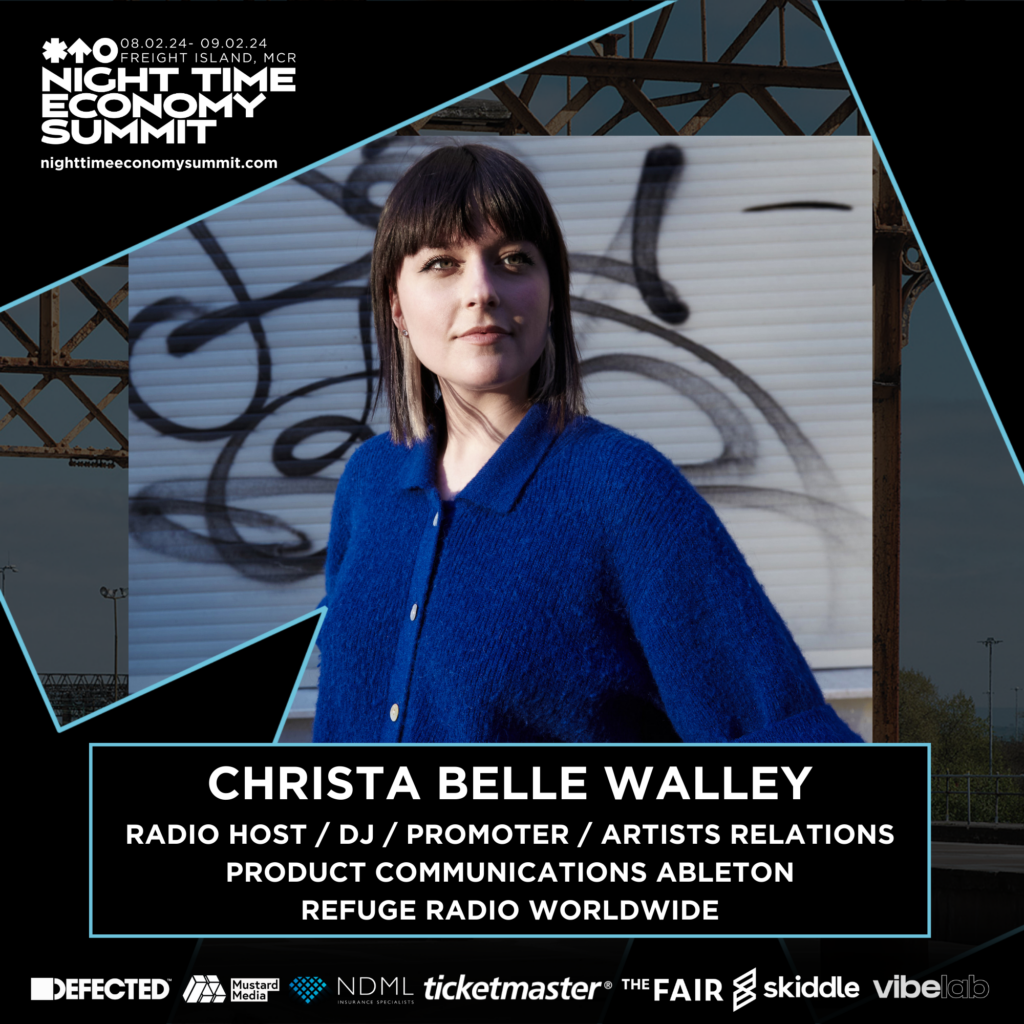
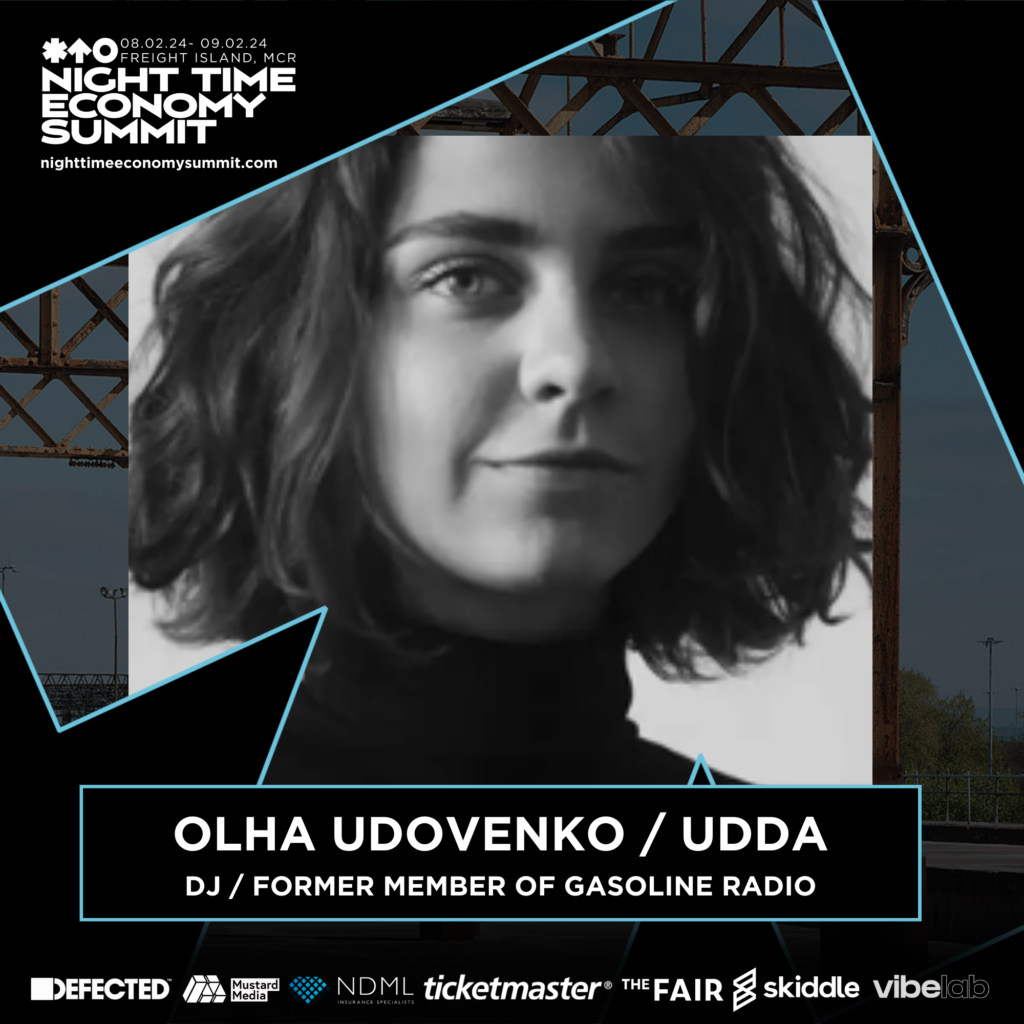
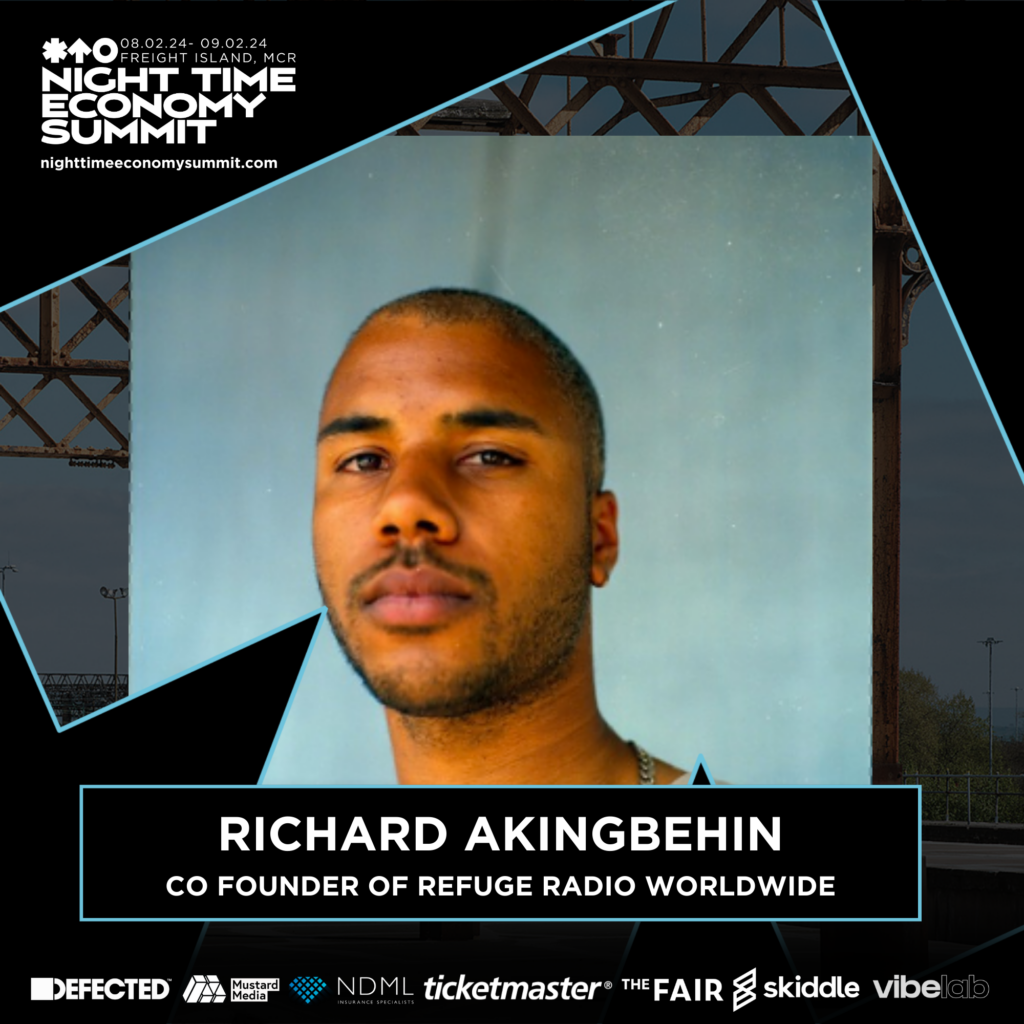
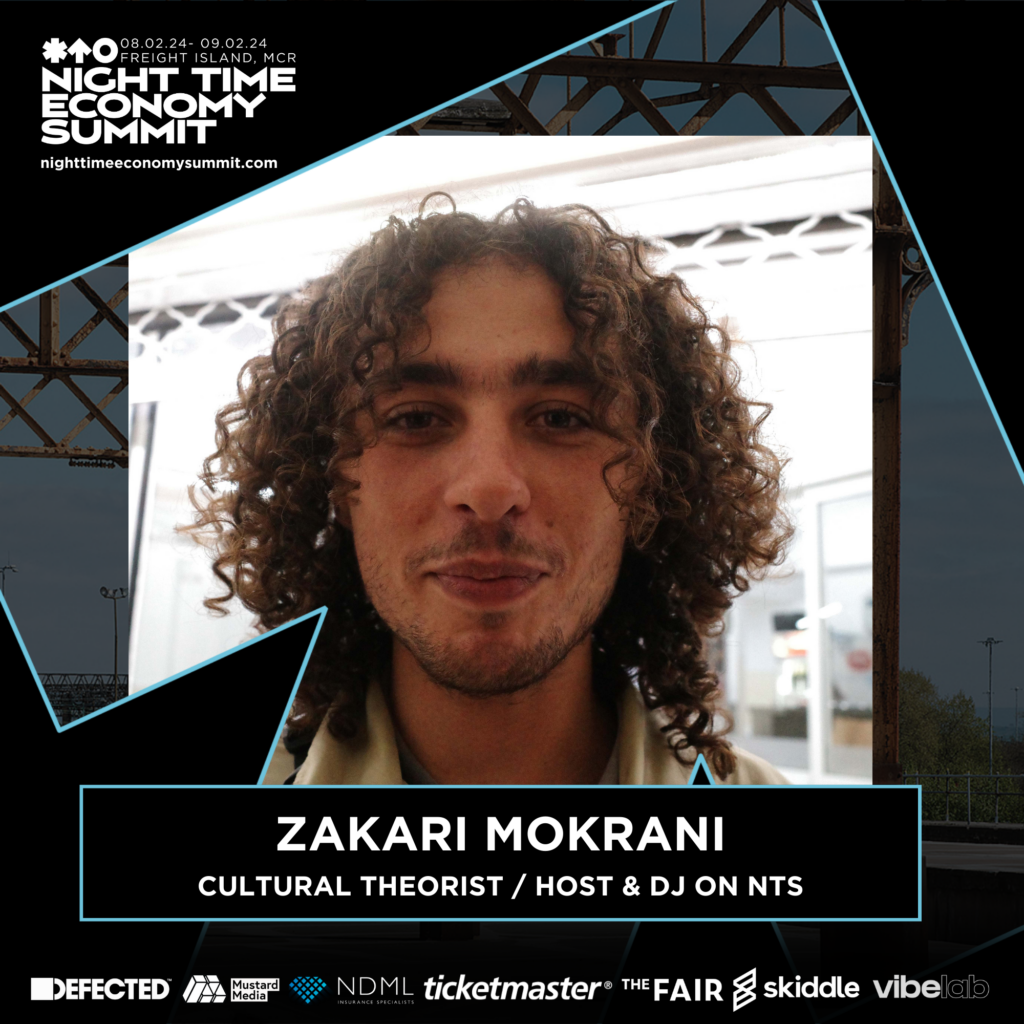
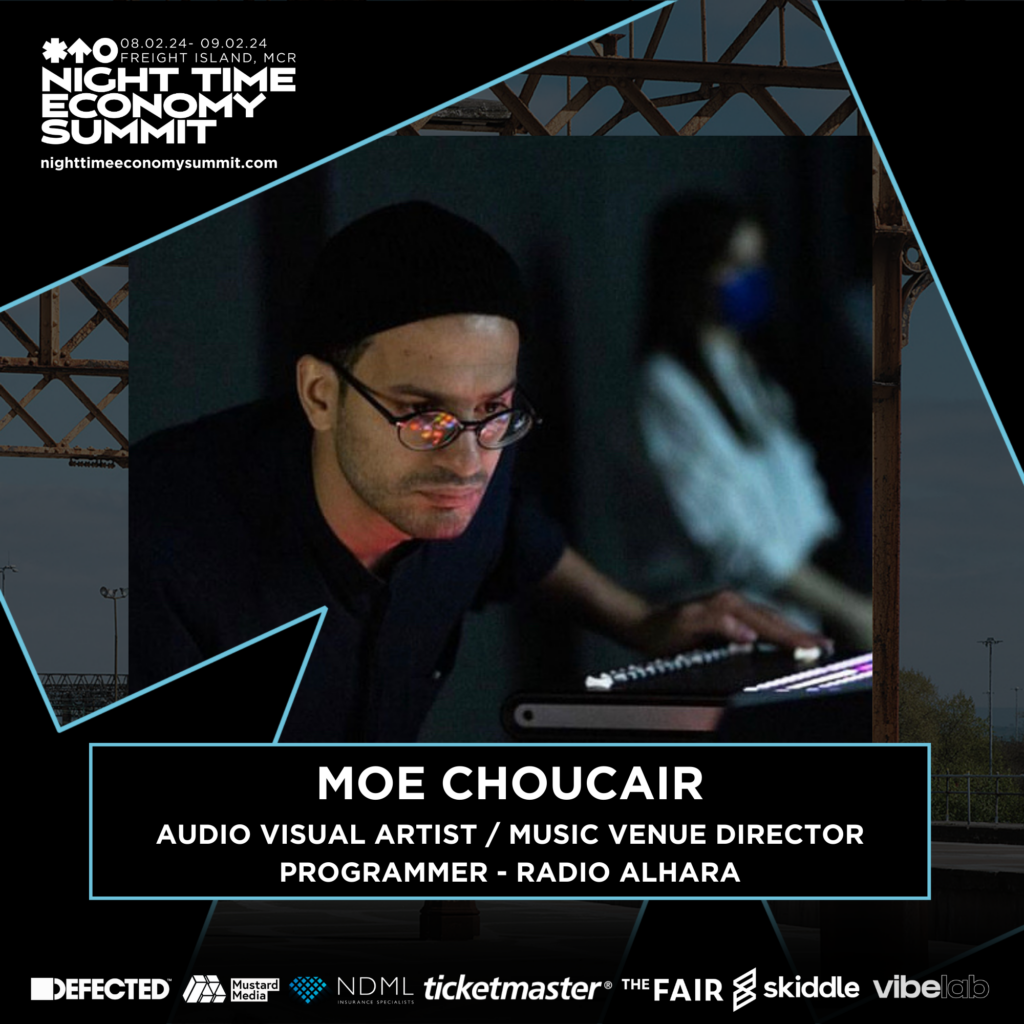
SESSION 3: 1:30 pm – 2:30 pm
Title: Sensory Immersion: Redefining “Club Culture” Experiences
Moderator: Anjali Prashar-Savoie, Cultural Producer, DJ, Journalist, London, UK
This session delves into strategies for redefining music and entertainment experiences, focusing on sensory immersion, inclusivity, relaxation, wellness, and personalisation in the club space.
Speakers include:
- Aoife Mc Guinness, Neuroscientist, Multi-Sensory Researcher, Founder of OverFlow, Berlin, Germany
- Georges de Saint-Mars, Curator and Producer at 36 degrés, Paris, France
- Opashona Ghosh is an artist, lecturer, and promoter in London, UK.
- Natalia Szczepanczyk is the segment manager for experiential applications at Holoplot, Berlin, Germany.
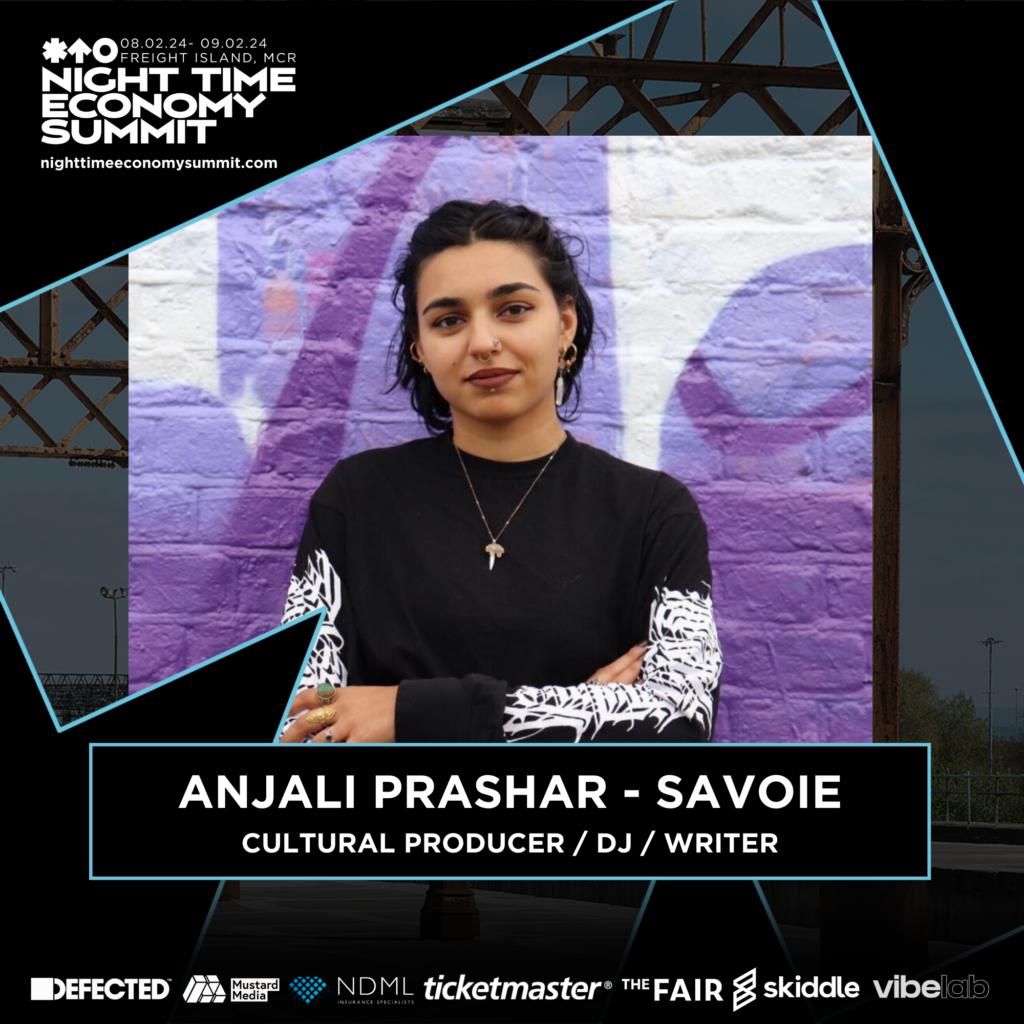
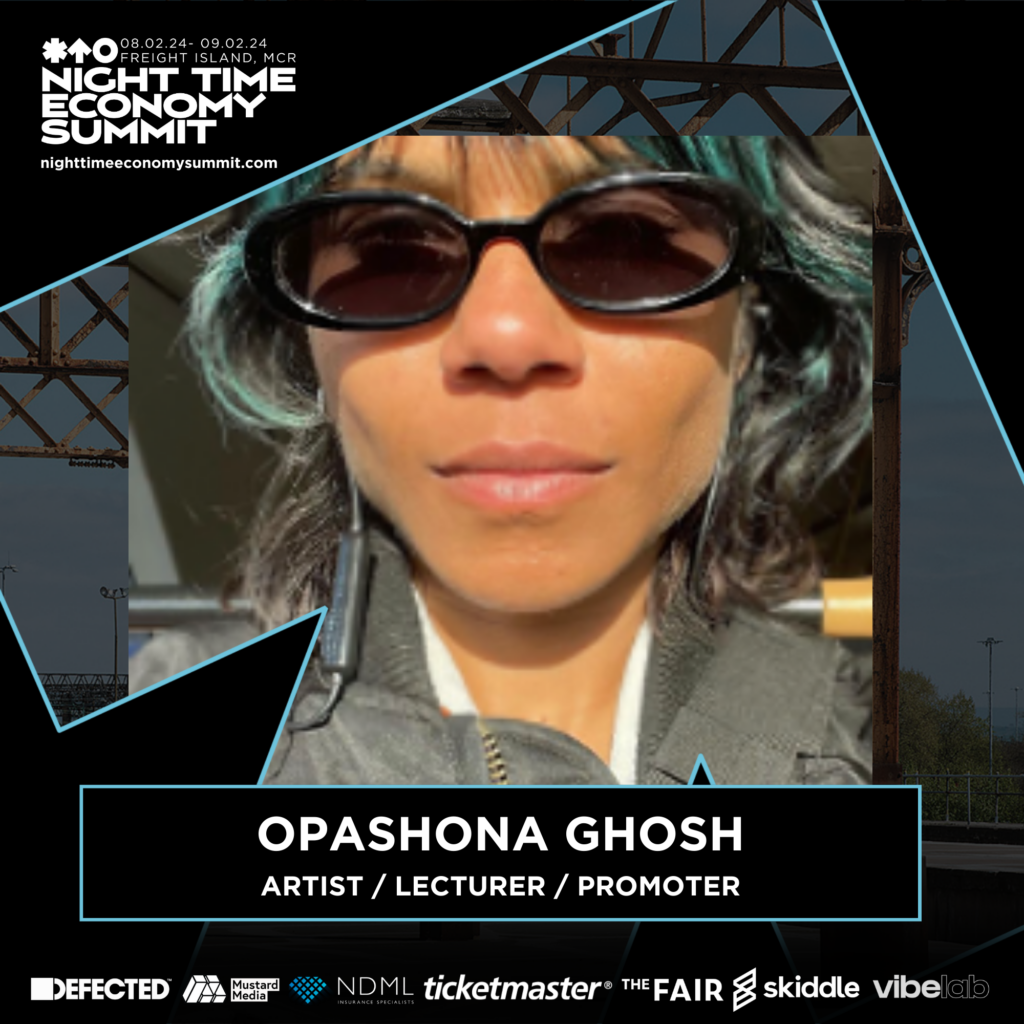
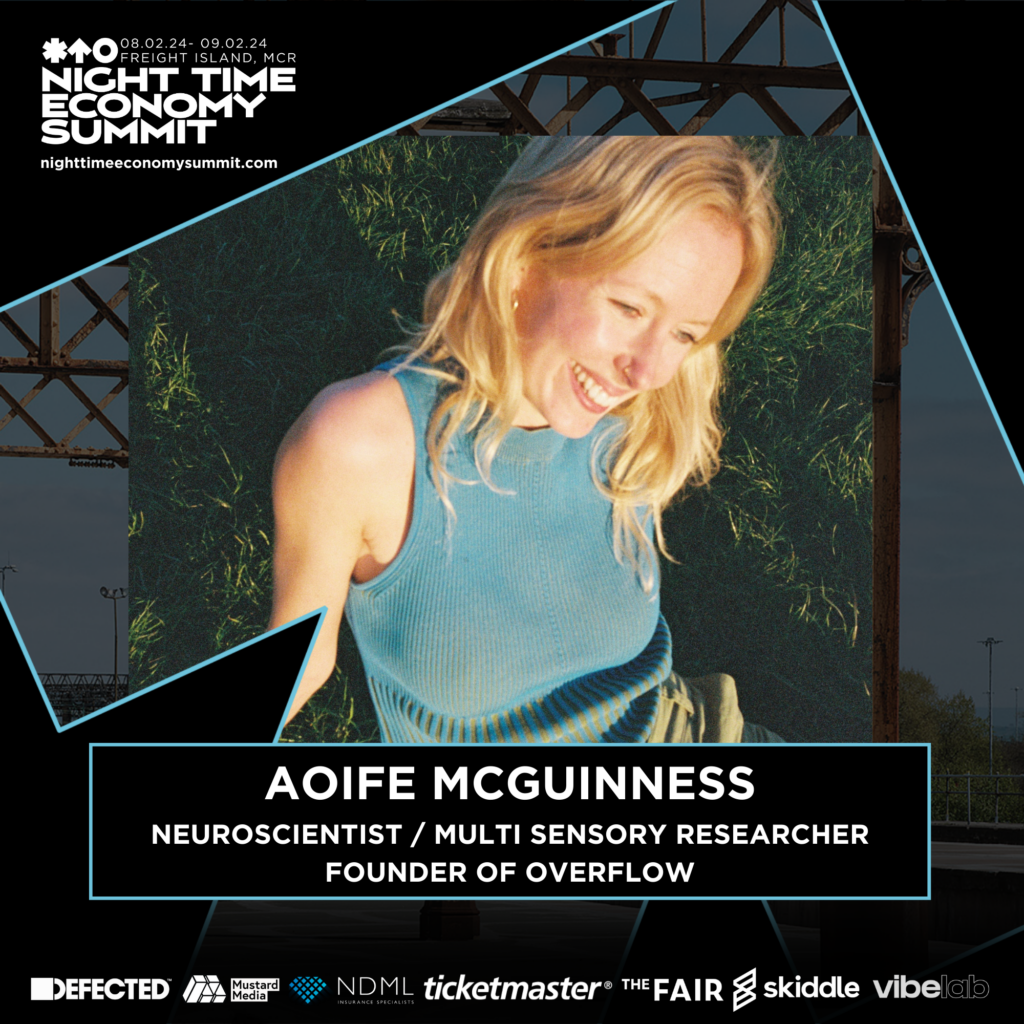
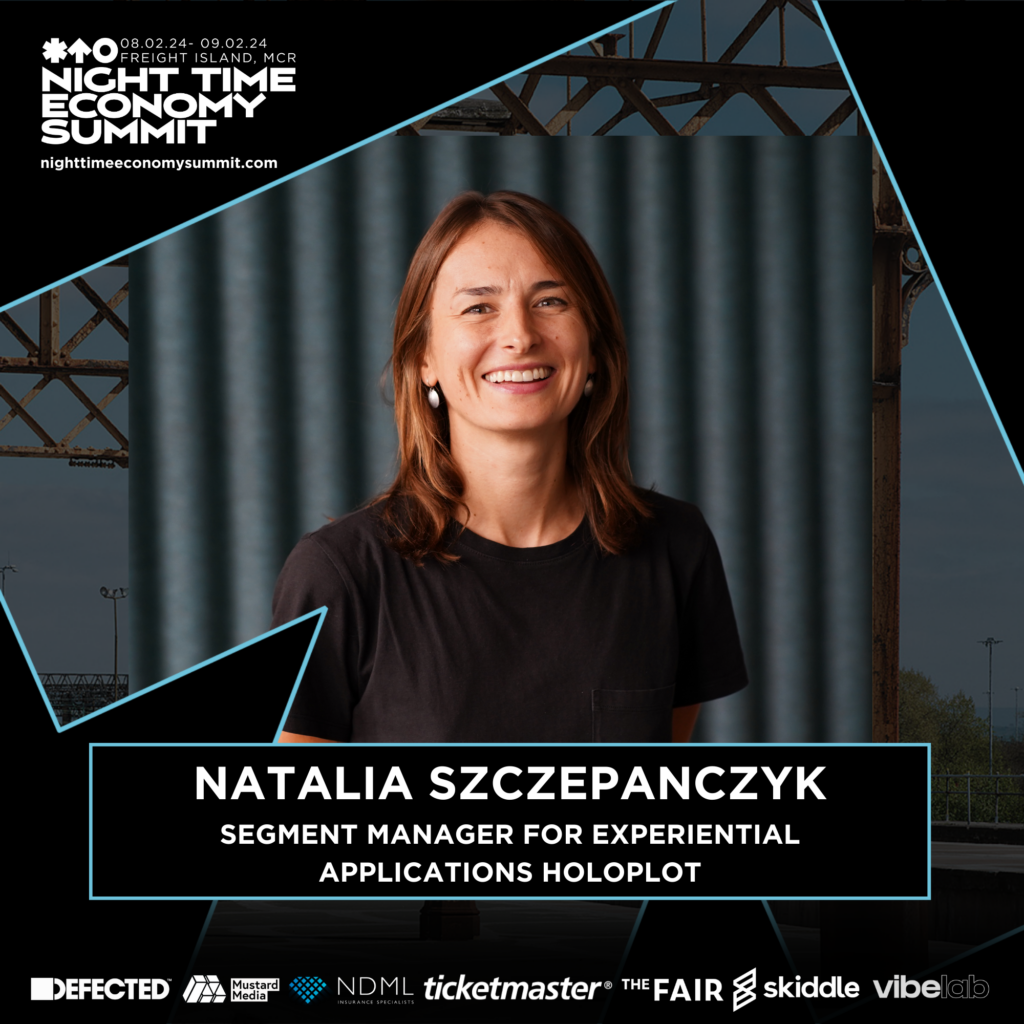
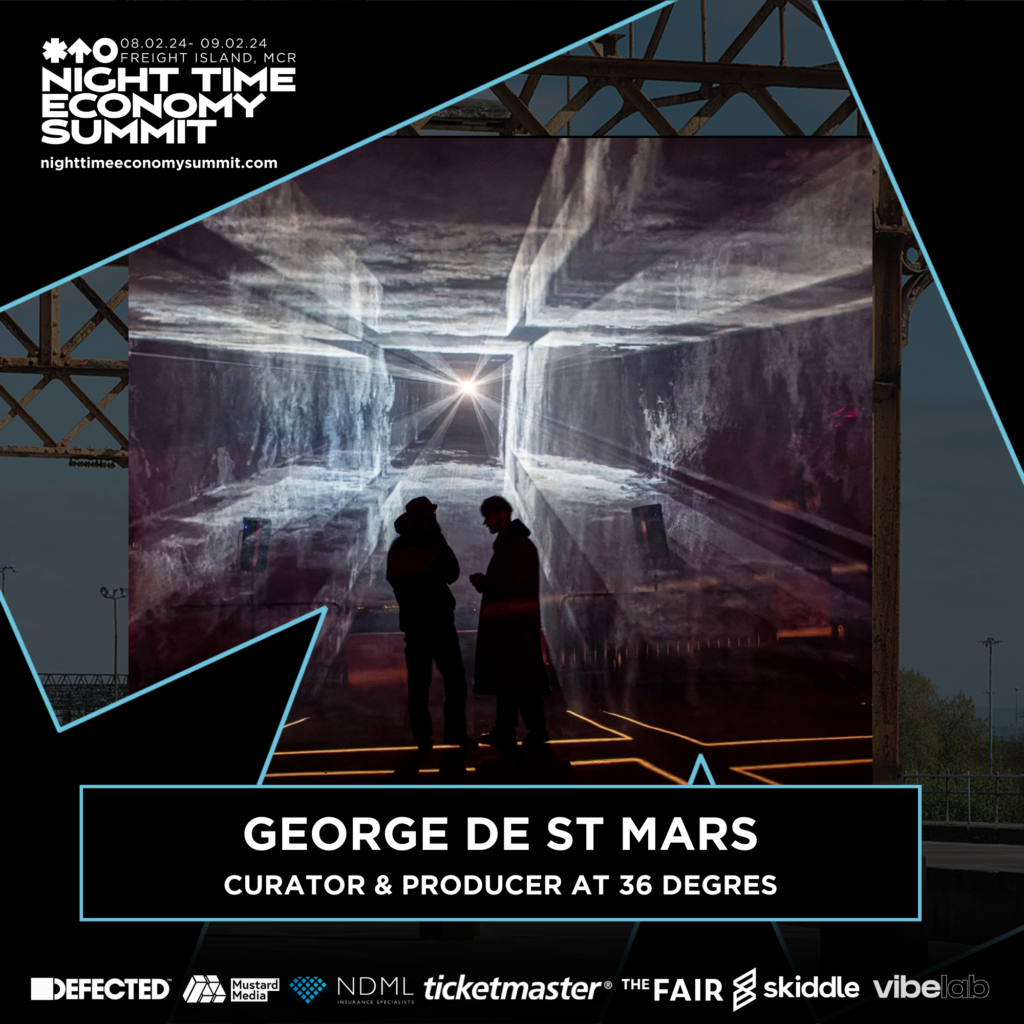
SESSION 4: 5:00 pm – 7:00 pm
Title: Nighttime Safety and Urban Solidarity: Navigating Urban Spaces
Moderator: Anna Sclimm, Artist and Promotor at Holobiont, Senior lecturer, MA Design for Social Innovation and Sustainable Futures, LCC, and Love Underground, London, UK
This panel explores how women, LGBTQI, and POC encounter and interact with urban spaces, drawing attention to the distinctive challenges, particularly regarding security, during daytime and nighttime. A Night Walk will follow from 6:00 pm to 7:00 pm.
- Andreina Sejas, Urban Governance and Innovation | Associate at Gehl, Paris, France
- Kenneth Bailey co-founded Design Studio for Social Intervention, Boston, USA.
- Lee-Ann Igbon, Labour Party Councillor, Executive Member for Vibrant Neighborhoods
- Georgia Green, Research and Insight Coordinator, Manchester Student Union
- Sacha Lord, Nighttime Economy Advisor for Manchester, Manchester, UK
Join us for these insightful discussions, which promise to shape the future of electronic music culture. Get tickets on the NTIA website quickly.
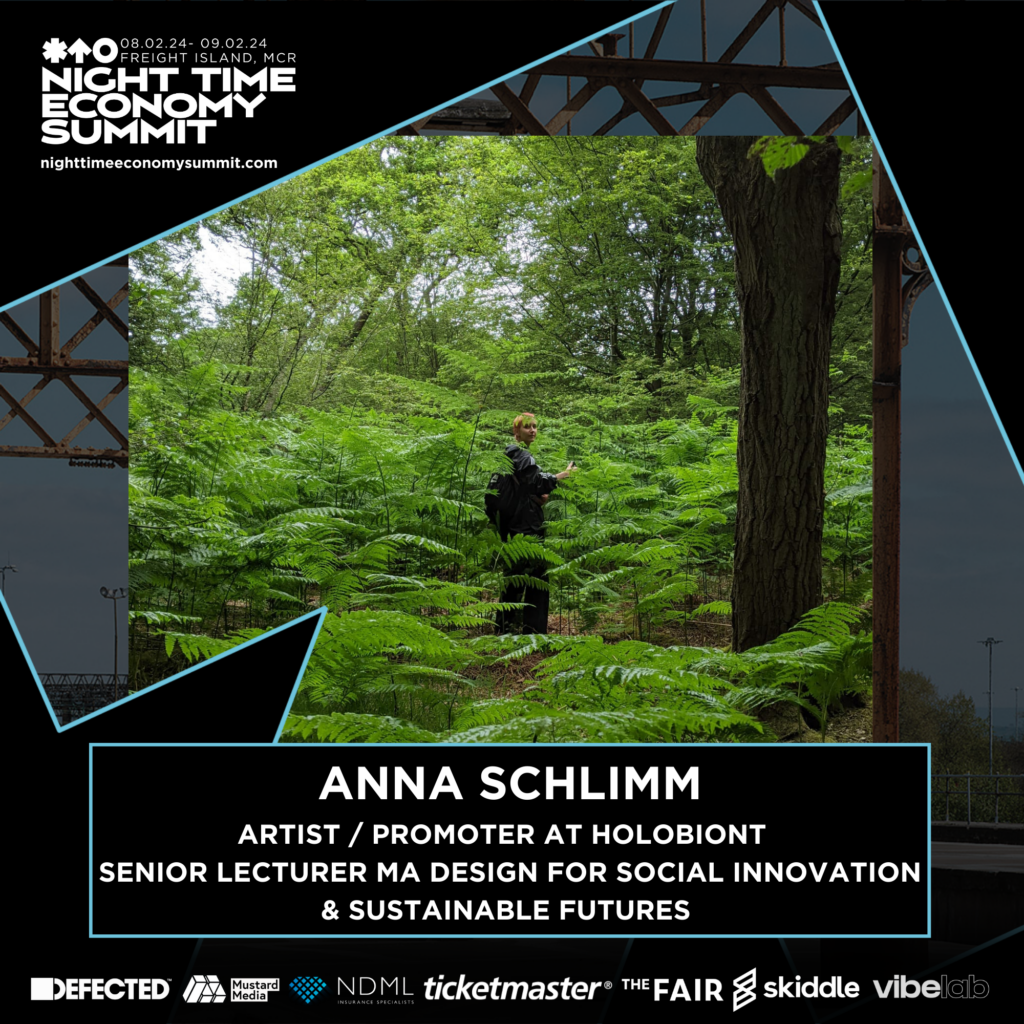
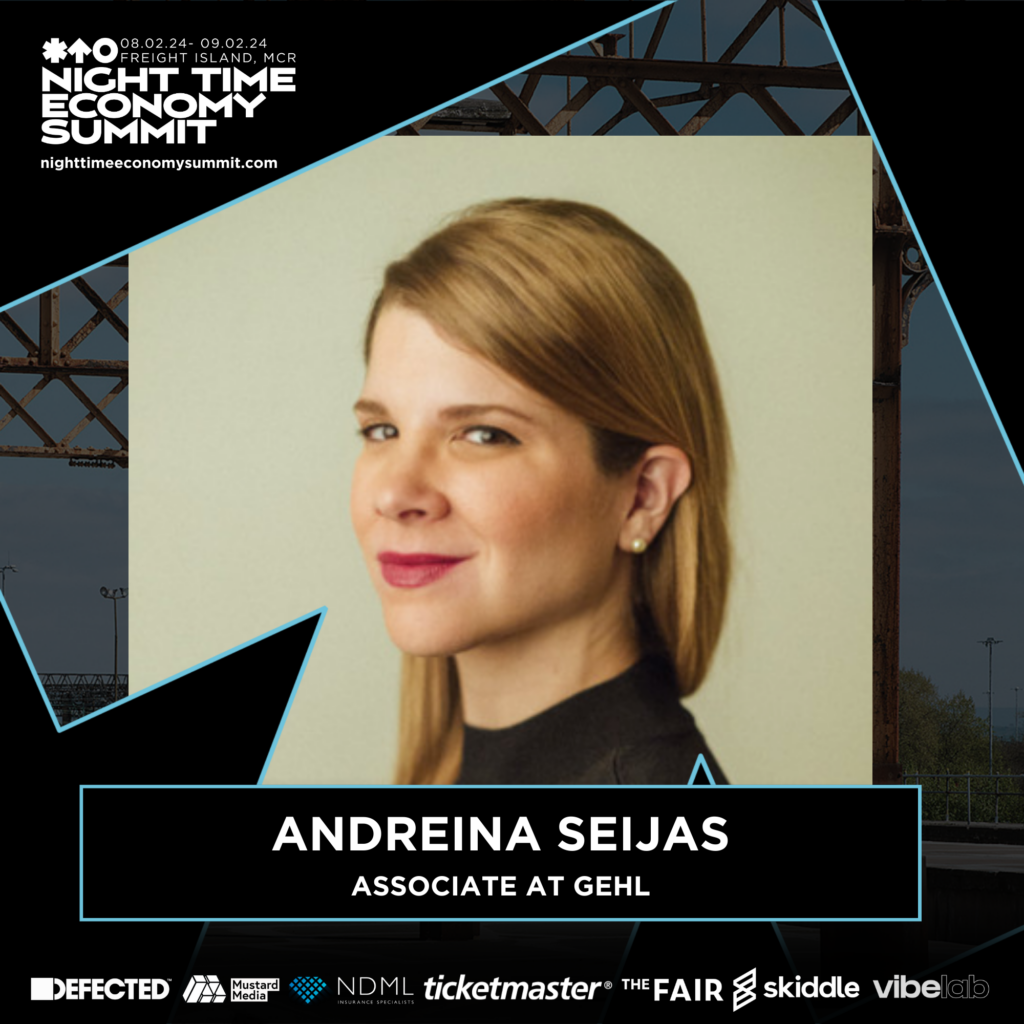
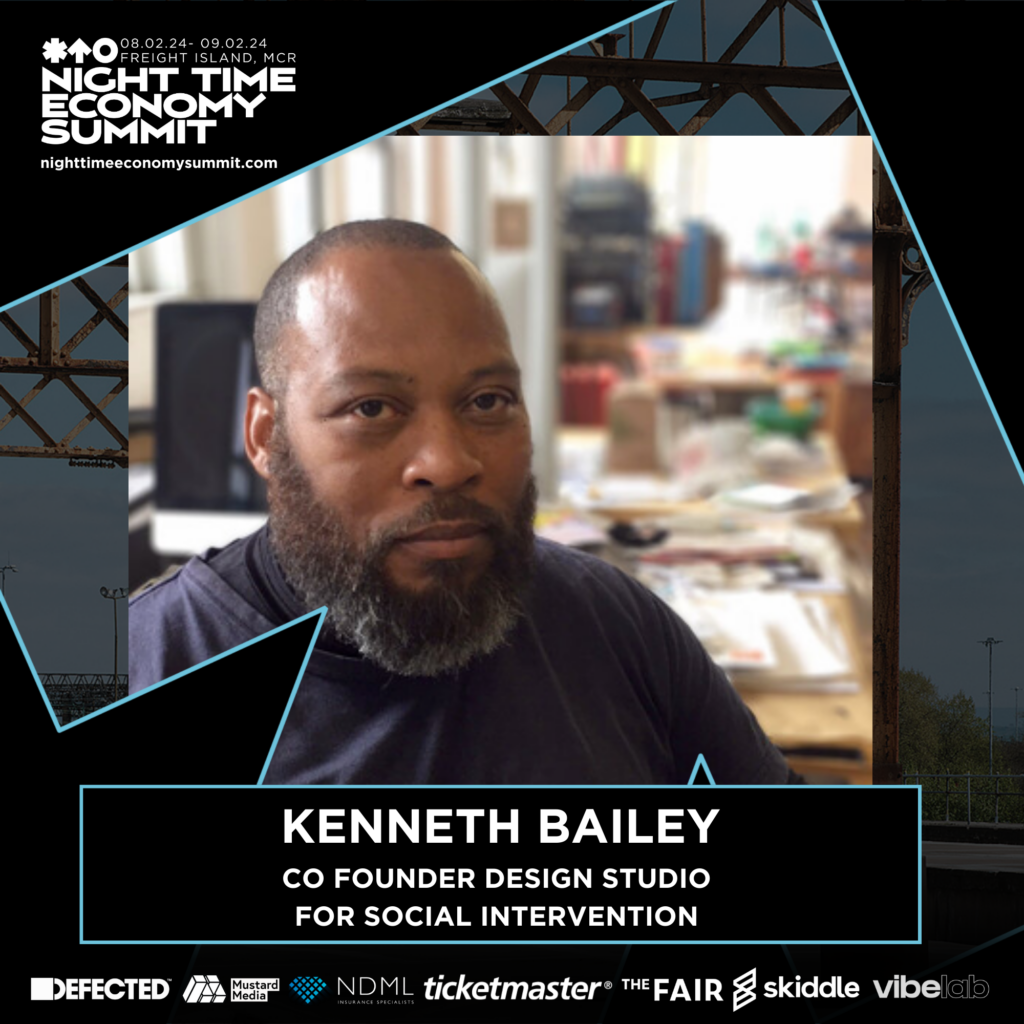
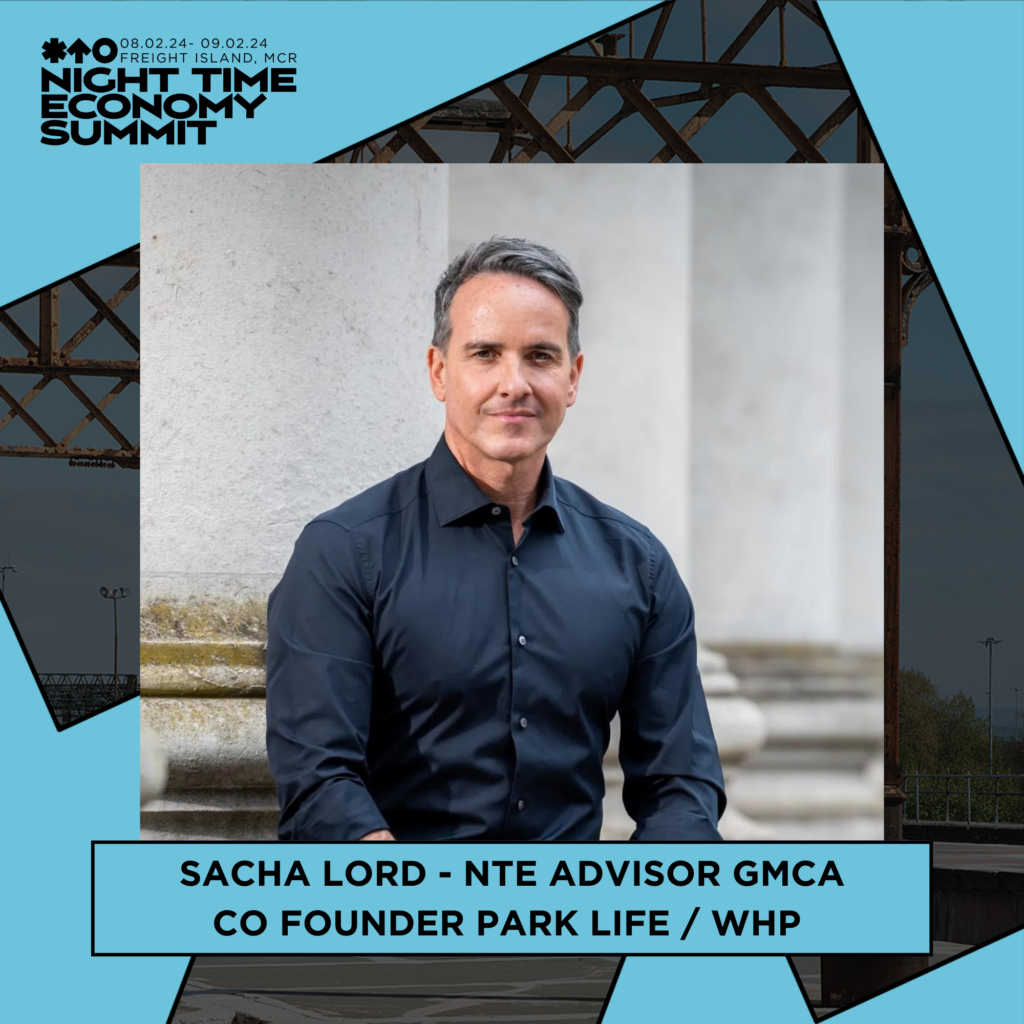
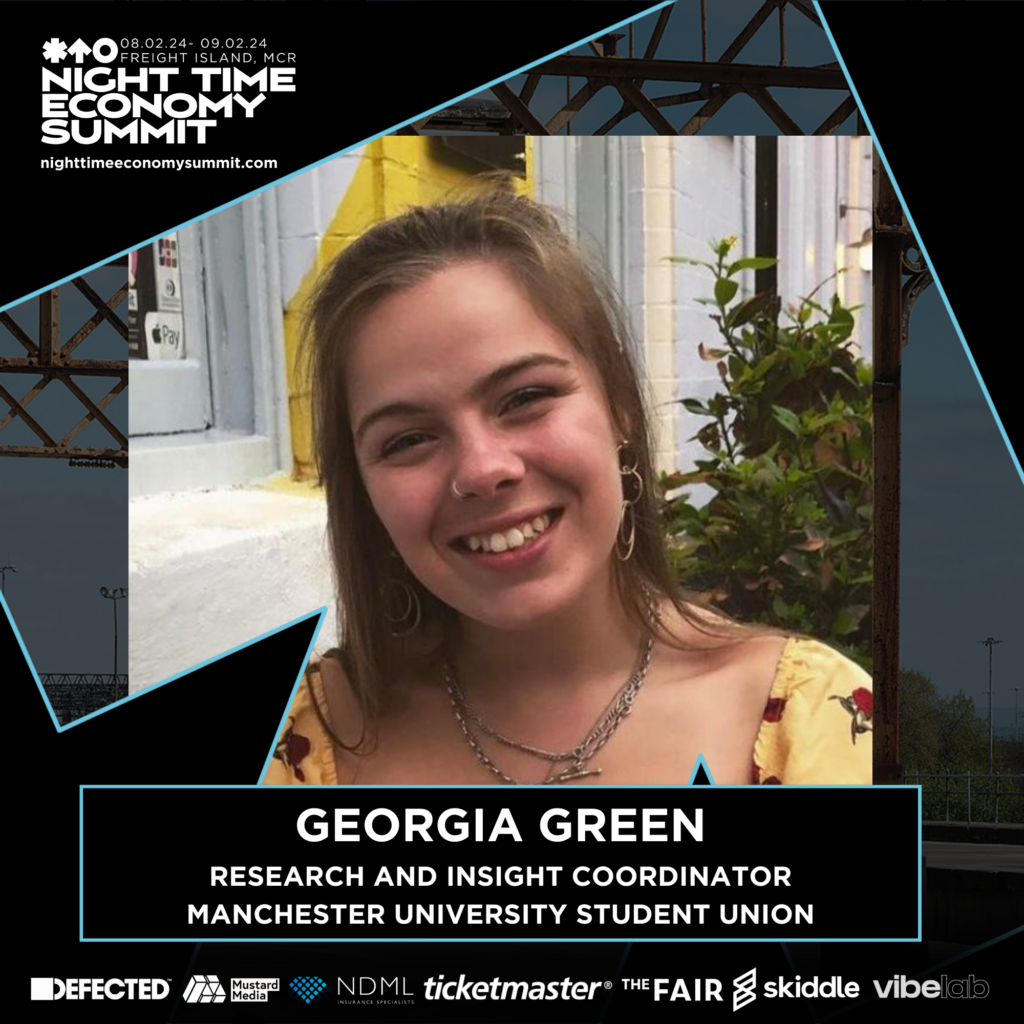
About NTIA
The Night-Time Industry Association aims to ensure a comprehensive understanding of the benefits of the UK’s nightlife industry and the significant positive impacts of this vibrant sector on society. They take pride in championing the incredibly talented and successful entrepreneurs who have made Britain one of the most thrilling and sought-after destinations for tourists globally.
About Vibelab
VibeLab is a research, consultancy, and advocacy agency dedicated to supporting creatives and preserving nighttime culture. Vibelab is a platform that fosters cultural exchange and exploration within the global electronic music community. Vibelab aims to celebrate diversity, inclusivity, and innovation in the electronic music culture through engaging events and discussions.
See the complete program here

